- Share via
Just a few Democrats defect from Nancy Pelosi during House speaker election
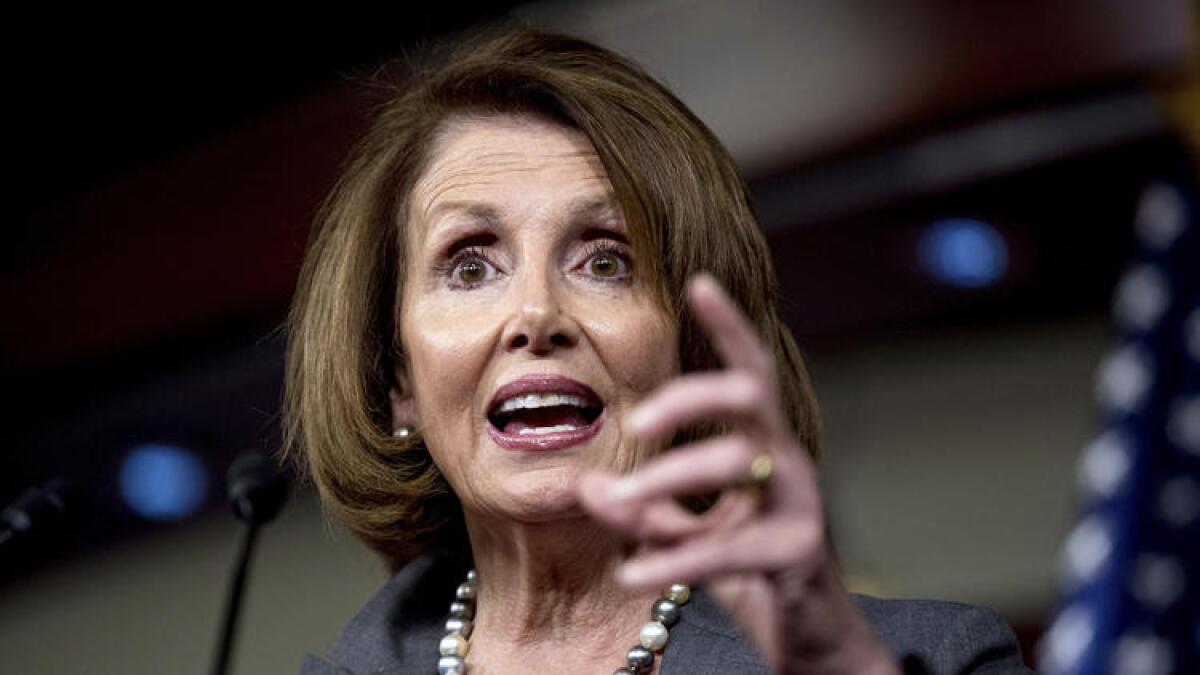
House Minority Leader Nancy Pelosi (D-San Francisco) was most Democrats’ pick for House speaker on Tuesday, but, as expected, she lost the gavel to Republican Paul Ryan of Wisconsin.
Some were watching to see if Democrats would back away from the minority leader, especially during a public vote, after the first serious challenge to her authority last month. But only a few did.
Rep. Jim Cooper (D-Tenn.) voted for Rep. Tim Ryan (D-Ohio), Rep. Kyrsten Sinema (D-Ariz.) voted for Rep. John Lewis (D-Ga.) and Rep. Ron Kind (D-Wis.) voted for Cooper.
Cooper and Sinema previously voted for another member over Pelosi.
In November, Ohio Rep. Ryan challenged Pelosi for her position. Some members said it was time for new leadership after Democrats’ major losses in the November election.
She beat back the challenge, arguing that Democrats need an experienced leader to counter President-elect Donald Trump. But on a 134-63 vote, she still won by her smallest margin in years.
Today’s roll call vote took nearly an hour. While voting, several Democrats mentioned recent news such as the proposed penalties for the Democrats (including a few Californians) who filmed a sit-in on the House floor in violation of House rules, and Republicans’ brief attempt to gut a committee that monitors congressional ethics.
- Share via
Assembly sets confirmation hearing after Gov. Brown formally nominates Becerra as state attorney general
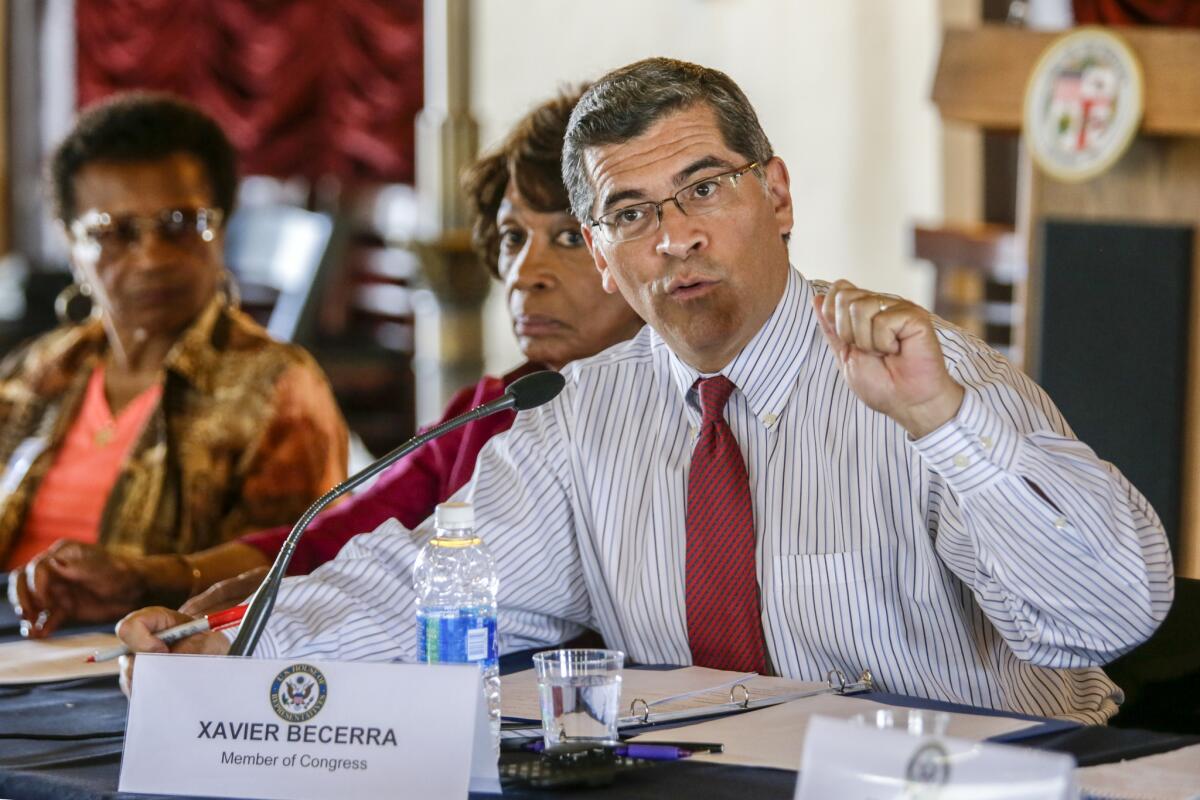
Less than an hour after state Atty. Gen. Kamala D. Harris resigned and took the oath of office for the U.S. Senate, Gov. Jerry Brown on Tuesday officially nominated Rep. Xavier Becerra to fill the vacancy and become California’s top law enforcement officer.
The state Assembly set a Jan.10 date for his first confirmation hearing.
The Assembly and Senate now have 90 days to act on confirmation of Becerra, a Democrat from Los Angeles, as state attorney general.
A letter from the co-chairs of the Assembly Special Committee on the Office of Attorney General, which will consider the confirmation, asks Becerra to submit written comments on five “critical issues confronting California today and over the next two years” remaining in the attorney general’s term.
Becerra was asked to respond to give his positions on immigration, including cooperation with federal immigration authorities and his view of sanctuary cities, civil rights, environmental protection, police accountability and consumer protection. The Congressman was also asked to describe his position on President-elect Donald Trump’s proposal for a registry for Muslim immigrants.
“In the next four years, Californians and our laws will encounter substantial challenges from the next President and his administration,” said the letter from Democratic Assemblymen Reggie Jones-Sawyer of Los Angeles and Mark Stone of Scotts Valley.
“Donald Trump has made multiple statements that directly contradict California law and policy,” the two lawmakers wrote. “Our next Attorney General will have great responsibility for protecting Californians and our values, and defending our laws.”
Becerra has served in Congress since 1992 and was most recently the first Latino member of the Committee on Ways and Means, as well as chairman of the House Democratic Caucus.
Becerra, 58, previously served in the state Assembly from 1990 to 1992.
“Xavier has been an outstanding public servant — in the state Legislature, the U.S. Congress and as a deputy attorney general,” Brown said when he announced last month that Becerra would be his nominee. “I’m confident he will be a champion for all Californians and help our state aggressively combat climate change.”
Harris became the first black woman to represent California in the U.S. Senate with a ceremony shortly after 9 a.m. Pacific time. She submitted her letter of resignation to the governor at the same time.
“I am proud of the work and accomplishments achieved by the Office of the Attorney General over the past six years,” Harris wrote. “As United States Senator, I look forward to continuing to work with you and other state and local leaders on important issues facing California and our nation.”
Harris later named Kathleen “Kate” Alice Kenealy chief deputy attorney general to lead the state Department of Justice as acting attorney general until Becerra is confirmed.
Updated at 11:24 am: This post has been updated to include setting of confirmation hearing.
Updated at 10:28 am: This post has been updated to include naming of acting attorney general.
- Share via
Kamala Harris sworn in as first Indian American senator and California’s first black senator

Kamala Harris sworn in

Kamala Harris sworn in
Before friends and family in a packed chamber, Kamala Harris was sworn in as California’s newest U.S. senator Tuesday morning. She became the first black woman the Golden State has sent to the Senate and the first Indian American to ever serve in the body.
- Harris, 52, a Democrat from Los Angeles, was sworn in by Vice President Joe Biden shortly after 9 a.m. PT as Sen. Dianne Feinstein (D-Calif.) and her new Senate colleagues looked on. Harris’ husband, Los Angeles attorney Doug Emhoff, her stepchildren, brother-in-law Tony West, sister Maya Harris, extended family as well as several state officials from across the country who traveled to celebrate with the now former state attorney general watched from the gallery.
- Share via
Meet the six Californians who are officially joining the largest congressional delegation today
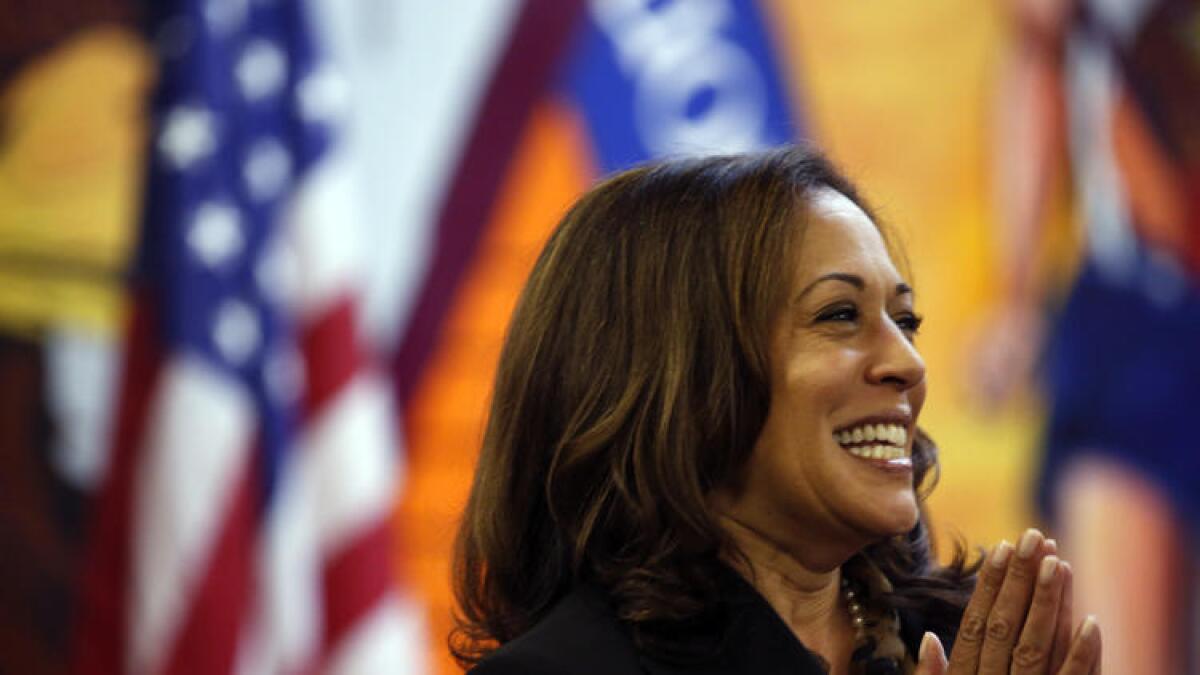
Today the 115th Congress will be sworn in, including California’s first new U.S. senator in more than two decades and five new House members.
In the Senate, members are sworn in one at a time and Sen. Dianne Feinstein (D-Calif.) is expected to walk her new colleague Sen.-elect Kamala Harris across the chamber to be sworn in.
Many eyes will be focused on Harris in the coming months. Considered a rising star in the party, she has already been floated as a possible presidential candidate for 2020.
Friends and family will fill the galleries as all 435 House members are sworn in at the same time. House and Senate leaders also hold a ceremonial swearing-in later in the day, when individual members can get a photo with Vice President Joe Biden.
California’s five new House members are Rep.-elects Ro Khanna (D-Fremont), Jimmy Panetta (D-Carmel), Lou Correa (D-Santa Ana), Salud Carbajal (D-Santa Barbara) and Nanette Barragán (D-San Pedro).
We’ll be tracking the new members throughout the day, but you can check out their backgrounds and biographies below.
- Share via
Assemblywoman rings in 2017 with a surprise marriage to a former lawmaker
For a legislator who frequently offers glimpses of her personal life on Twitter, the new year brought something entirely different to share: a wedding.
Assemblywoman Lorena Gonzalez (D-San Diego) was married on Sunday to a former Republican member of the Assembly, Nathan Fletcher. The ceremony, attended only by the couple’s close family, was officiated by former Assembly Speaker John A. Pérez.
Gonzalez and Fletcher, who each have children from previous marriages, have been together since 2015.
Fletcher changed his GOP registration to nonpartisan during an unsuccessful race for mayor of San Diego in 2012. He later became a Democrat and served as a delegate for Hillary Clinton at the 2016 Democratic National Convention.
It was Fletcher who made the news official in a late-afternoon tweet, after Gonzalez had been dropping hints to her followers.
Gonzalez said that the couple would celebrate with about 200 people who had been invited to what they thought was a surprise party on Sunday night for Fletcher’s 40th birthday.
“The surprise is on them!” she wrote in a message to The Times.
- Share via
California legislators are mourning the death of Sutter Brown, Gov. Jerry Brown’s famous dog
Sutter Brown, Gov. Jerry Brown’s famous corgi, died Friday with Brown and First Lady Anne Gust Brown by his side. His illness, and his death, sparked an outpouring of support in political circles and beyond.
- Share via
Sutter Brown, Gov. Jerry Brown’s beloved corgi, dies: ‘It’s a sad day for all who loved Sutter’
Sutter Brown, who died on Friday, was last seen in public on election day, accompanying the governor to vote at his Sacramento polling place. In recent days, Sutter’s health took a turn for the worse, the governor’s office said.
Sutter died with the governor and his wife at his side, and was buried Friday afternoon on his family’s Colusa County ranch, according to a statement from the governor’s deputy press secretary, Deborah Hoffman.
“It’s a sad day for all who loved Sutter,” Hoffman said.
- Share via
Kamala Harris picks a former Clinton staffer to be her communications director
- Share via
How this climate scientist is preparing for Trump
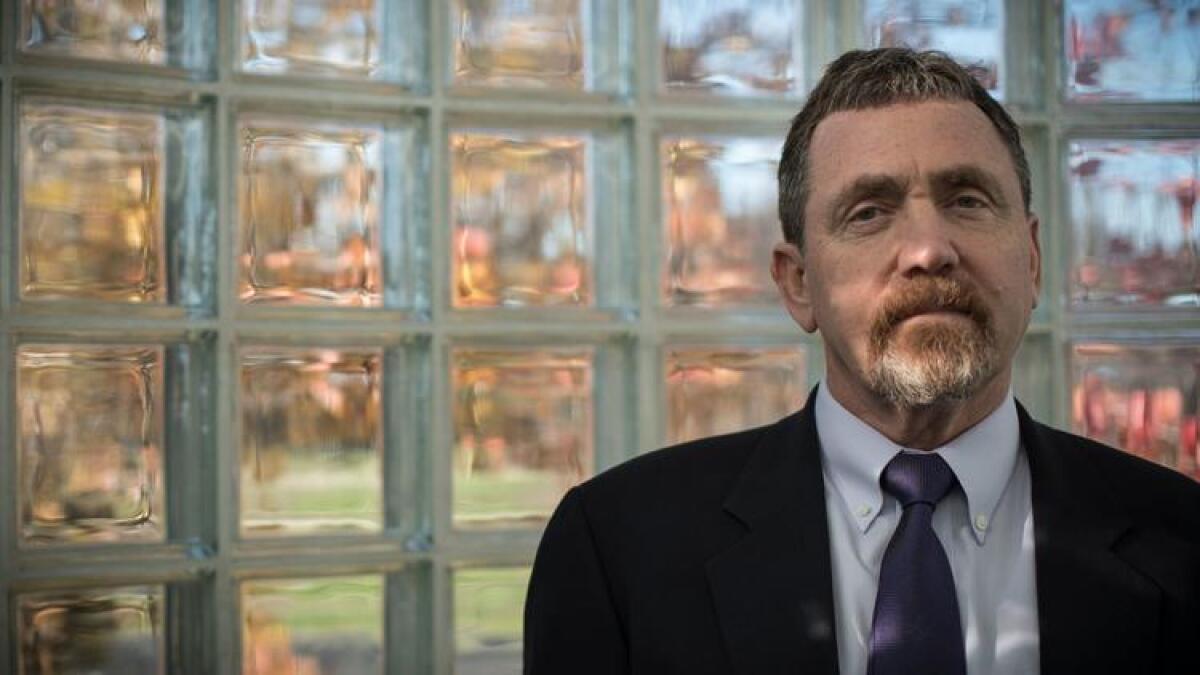
Donald Trump’s victory sent shock waves through the environmental community, but fears are particularly heightened among scientists who are employed by the federal government or rely on the data it generates. There are concerns that younger generations may avoid working for U.S. agencies or decide not to focus on climate change because they don’t see a future working in the field.
The election may already have had a chilling effect: Some working in national laboratories declined to speak about the impact the next administration could have on research they consider to be crucial to the fate of the planet.
Ben Santer has responded differently. Although he’s soft-spoken in person, the 61-year-old scientist has become more vocal over the years in hopes of beating back claims that climate change isn’t real.
- Share via
Kamala Harris makes another hire for her Senate staff
- Share via
California needs a specific ban on smoking pot while driving, these lawmakers say

Two state legislators say Californians might think it’s illegal to smoke marijuana while driving, but that there’s no specific ban on the practice in state law.
Assemblyman Evan Low (D-Campbell) and Sen. Jerry Hill (D-San Mateo) said Thursday that they’ll introduce legislation to close what they call a loophole.
The lawmakers said Proposition 64, the state’s new law legalizing marijuana, allows a citation for having an open container of marijuana in a vehicle. But, they said, it doesn’t expressly ban the use of the drug while driving.
“This legislation makes our laws for smoking [marijuana] while driving consistent with drinking while driving,” Hill said in a written statement.
The bill, which will be introduced next week, would make a driver’s marijuana use a traffic infraction. Its authors said the bill would allow a judge the option to consider the offense either an infraction or a misdemeanor.
- Share via
On Sunday, new laws take effect in California. What can you expect?
Californians’ lives will be ruled by hundreds of new laws starting Sunday, including harsher sanctions against criminals, extra restrictions on companies such as Uber and Lyft, and a boost in the minimum wage to $10.50 from $10.
Residents of the Golden State will be able to get a glass of wine when getting a haircut and take selfies with their ballots. Gender-specific bathrooms will be a thing of the past if there’s only one toilet, and good Samaritans can break into cars to free dogs at risk of heatstroke.
- Share via
Should California lawmakers work to end the electoral college?
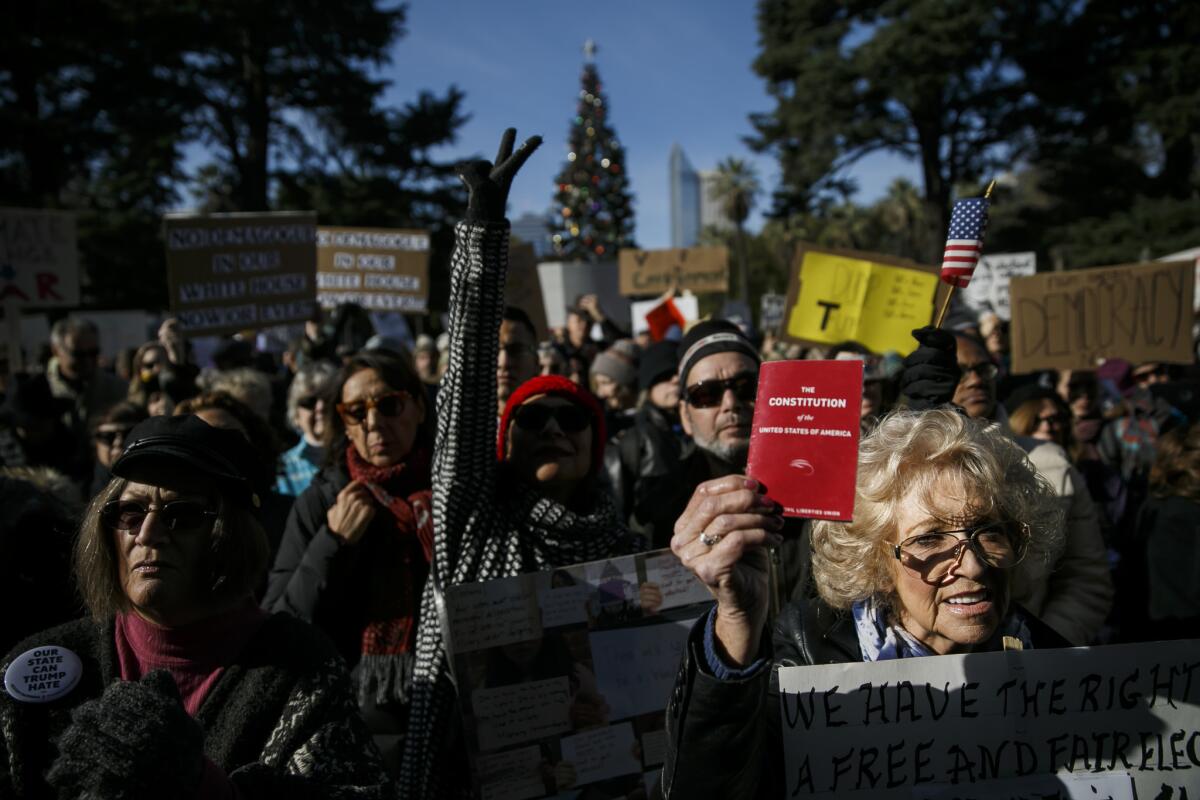
Protestors across the nation lost their last ditch attempt to sway the electoral college from voting for president-elect Donald Trump last week. But a California lawyer wants to reignite debate over the process that sealed Trump’s victory in 2018.
Rodrigo Howard, an attorney with CapKey Advisors, has proposed an initiative for the 2018 ballot that would ask voters whether state lawmakers should work to modify or eliminate the electoral college, so that the vote for president and vice president more closely resembles the outcome of the national popular vote.
Howard said the proposal is an open-ended measure that could encourage lawmakers to use their authority to adopt interstate compacts or ratify amendments to the U.S. Constitution, a difficult process that involves the approval of three-fourths of the states. The petition was received on Wednesday by the Attorney General’s office.
Changing the electoral college process is a long shot. But the system has been at the center of heated debate since the election of Trump, who won the presidency with 304 electoral college votes, though he lost the national popular vote — Hillary Clinton defeated him by almost 2.9 million ballots.
Howard said he refused “to believe change is impossible.”
“The electoral college is an archaic system with roots in 18th century compromises, and one of those compromises has its roots in slavery,” he said. “We are stuck with a system that does not have moral or political legitimacy.”
- Share via
Contributions roll into Antonio Villaraigosa’s campaign for governor
- Share via
Gov. Jerry Brown selects two top advisors for spots on the California Public Utilities Commission
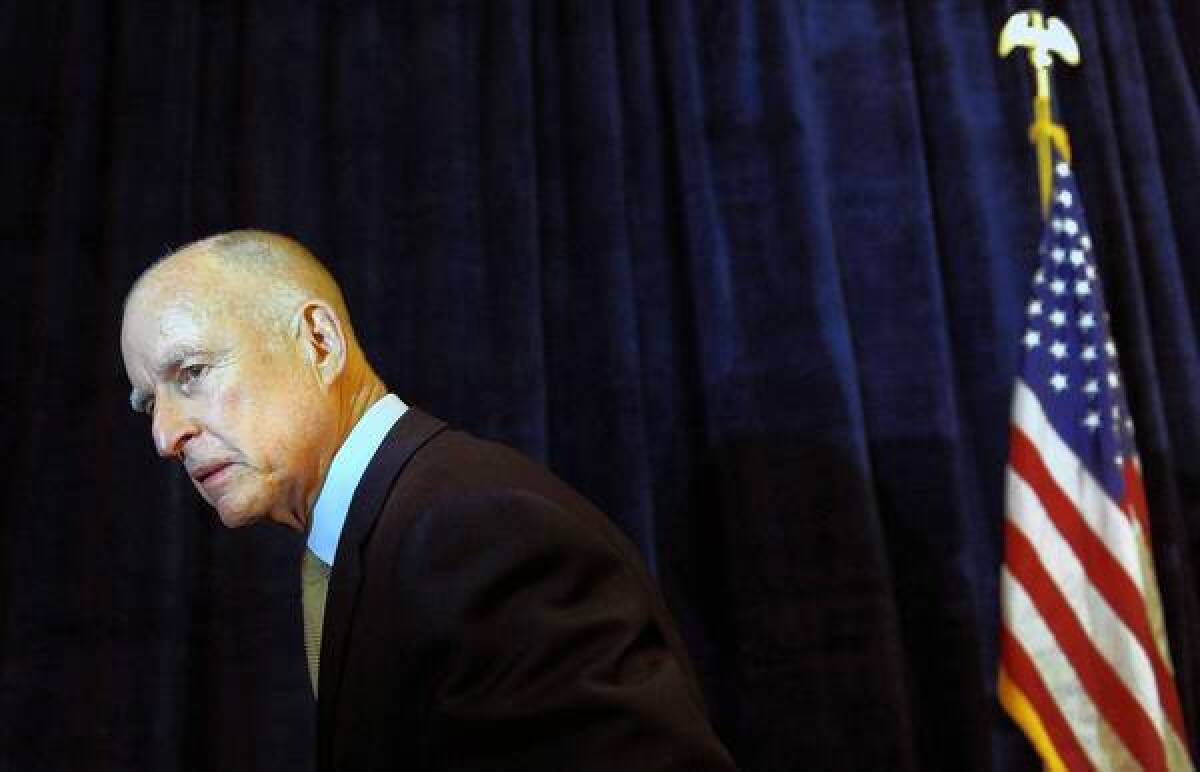
Gov. Jerry Brown has chosen two of his closest advisors on environmental and climate change issues to fill positions on the California Public Utilities Commission, the powerful state agency that regulates energy companies and the telecommunications industry.
On Wednesday, Brown nominated Cliff Rechtschaffen and Martha Guzman Aceves to serve six-year terms on the commission, effective next month. All five CPUC commissioners are appointed by the governor, subject to confirmation by the state Senate.
Rechtschaffen has served as the governor’s senior advisor on climate and energy issues for more than five years. Guzman Aceves, Brown’s deputy legislative affairs secretary, has focused on energy and environmental issues.
“Both have sound judgment and a commitment to protecting ratepayers and ensuring safe, reliable and climate-friendly energy in California,” Brown said in a written statement.
The appointments will mean a departure from the utilities agency for two sitting commissioners, Mike Florio and Catherine Sandoval, once their terms expire next month. Florio had faced several years of questions about his role in private conversations with the state’s biggest power utility, Pacific Gas & Electric Co.
- Share via
California’s former lieutenant governor could become Trump’s Agriculture secretary
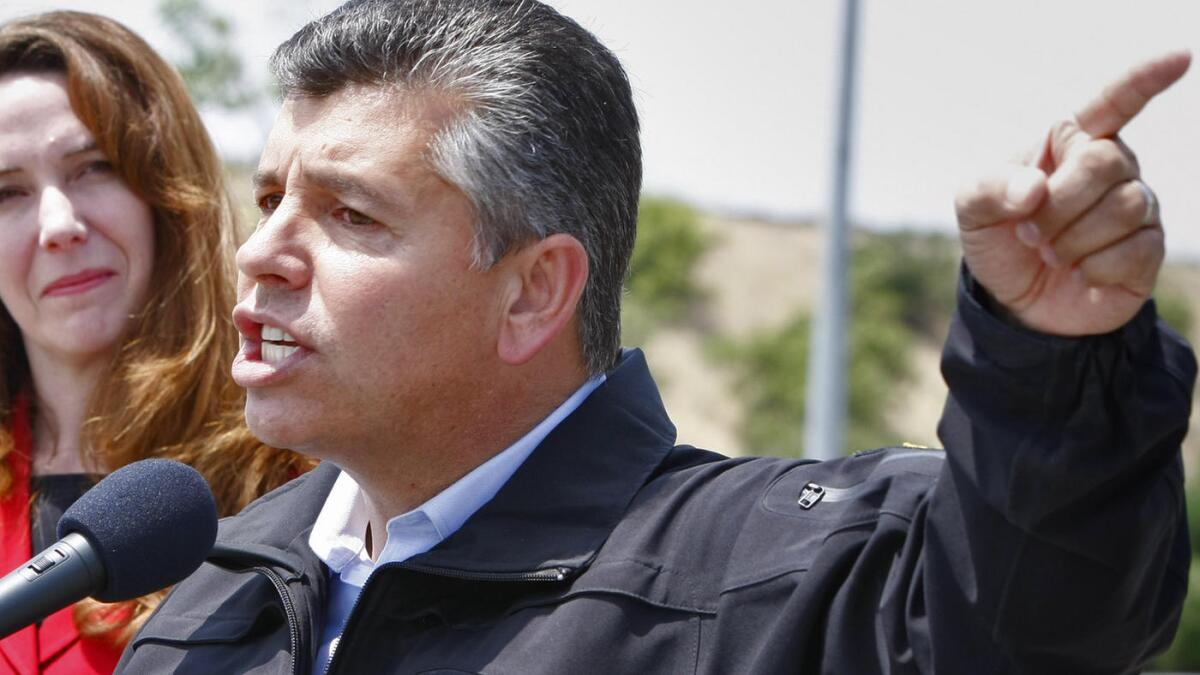
President-elect Donald Trump is considering former California Lt. Gov. Abel Maldonado to lead the Agriculture department, a move that would bring greater diversity to the Republican’s Cabinet.
Maldonado will meet with Trump on Wednesday at his Palm Beach, Fla., estate. Trump spokesman Sean Spicer noted that Maldonado, owner of Runway Vineyards in the Santa Maria Valley, comes from three generations of farmers and has “strong roots in the agriculture industry of California.”
- Share via
Kamala Harris’ former campaign manager joins one of California’s top political consulting firms
Juan Rodriguez, the campaign manager for California Atty. Gen. Kamala Harris’ successful bid for the U.S. Senate, is joining the San Francisco-based political consulting team led by veteran Ace Smith, who has worked for Hillary Clinton and Gov. Jerry Brown.
Rodriguez will anchor the new Los Angeles office of the consulting firm, known as SCN Strategies. The firm served as Harris’ lead consultancy during the Senate campaign.
“Adding Juan as a partner with a new footprint in Southern California dramatically expands our offering,” Smith said in a statement.
The addition of Rodriguez comes as California’s 2018 race for governor inches closer on the horizon. SCN works for Democratic Lt. Gov. Gavin Newsom. He faces a growing field of candidates, including former Los Angeles Mayor Antonio Villaraigosa, a former SCN client.
Before joining the Harris campaign, Rodriguez worked as a senior advisor to the attorney general. He also worked as Los Angeles’ director for state relations when Villaraigosa was mayor. Rodriguez is 31 and lives in Los Angeles.
- Share via
New and returning California legislators divvy up committee assignments
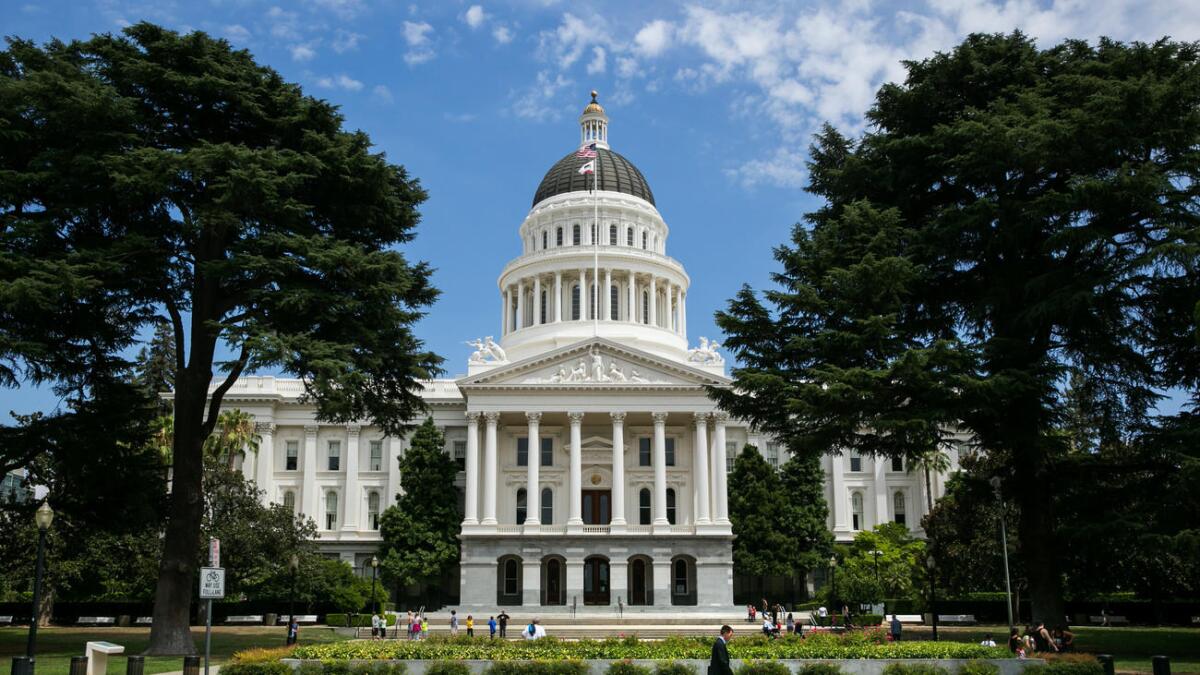
California legislative leaders have rounded out their choices for dozens of policy panels, with a few freshman legislators winning committee gavels and women leading a quarter of the committees in the Assembly.
Assembly Speaker Anthony Rendon (D-Paramount) announced the assignments Tuesday following the Senate selections made by Senate President Pro Tem Kevin de León (D-Los Angeles) last week.
Ten legislators who were newly elected to posts in Sacramento on Nov. 8 will serve as committee chairs in the two houses. Rendon’s office said Tuesday more women would lead standing or special Assembly committees in 2017 than in the previous pair of two-year legislative sessions.
Only a handful of the state Capitol’s most powerful committees, however, will change hands.
Notable new selections include state Sen. Holly Mitchell (D-Los Angeles) as chair of the Senate’s budget committee; Assemblyman Chris Holden (D-Pasadena) as chair of the Assembly’s energy and utilities committee; and state Sen. Ben Allen (D-Santa Monica) as chair of the Senate’s education committee.
- Share via
Democratic delegate who leads an L.A. Islamic group criticized for tweet about Russian military plane crash
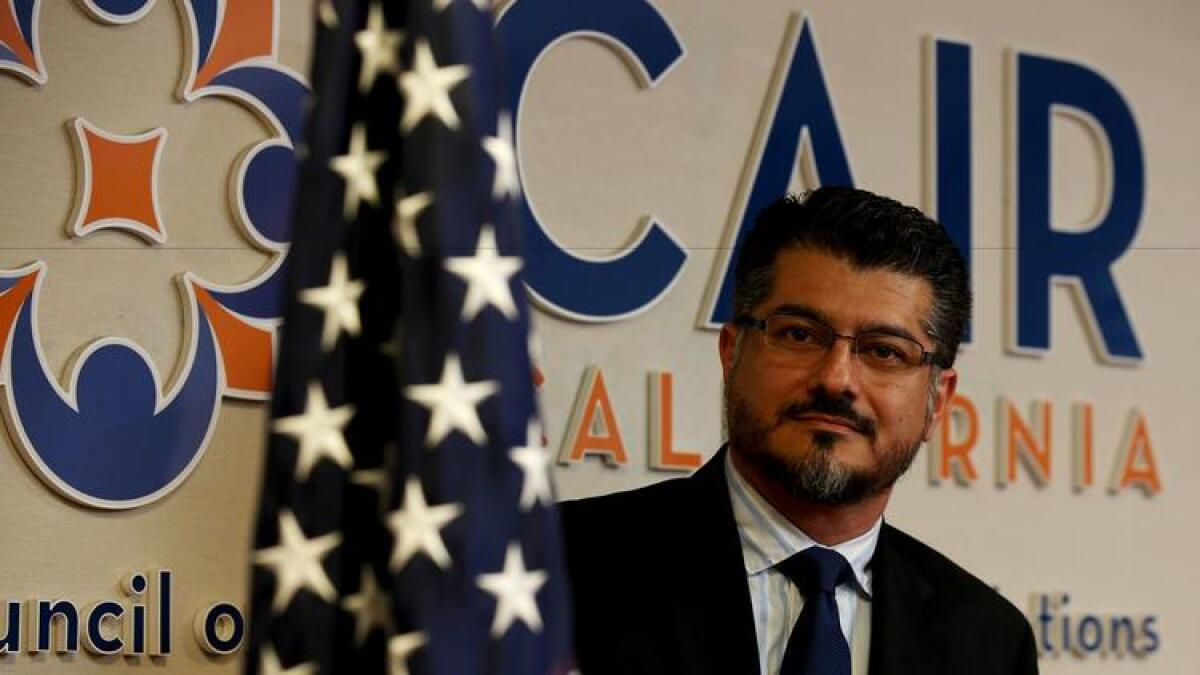
Hussam Ayloush, executive director of the Council on American-Islamic Relations’ Los Angeles chapter and a California delegate to this year’s Democratic National Convention, triggered a social media uproar on Christmas Day when he sent out a tweet that appeared to imply he wished more people died in a Syria-bound Russian military plane that crashed.
“I’m sad about the crashed Russian military jet. The TU-154 could have carried up to 180 military personnel instead of just 92!” Ayloush said in his tweet.
All 92 people aboard the plane are believed to have died when it crashed into the Black Sea on Sunday morning. Among the passengers killed were members of world-famous Russian military choir who were scheduled to perform at a Russian air force base in Syria.
Ayloush, deleted his tweet a short time later.
In a series of follow-up tweets and a Facebook post, he said he was unaware that noncombatants were among those aboard the plane. But he did not address the death of other Russian military personnel, saying that “Russia’s military is engaging in major war crimes and atrocities against innocent civilians in Syria.”
Ayloush’s initial comments triggered immediate criticism on Twitter and were picked up a day later by the ultraconservative news site Breitbart and other media outlets.
Conservatives on Twitter were quick to point out that Ayloush is a member of the California Democratic Party. Ayloush was an elected convention delegate and is a member of the state party’s executive board, which is made up of about 500 party members.
Ayoush was not available for comment on Tuesday, and a spokeswoman for CAIR-LA said his Facebook post on the matter was his response.
- Share via
John Benoit, Riverside County supervisor and former legislator, loses battle with cancer
John Benoit, a veteran state legislator who went on to serve seven years as a Riverside County supervisor, died Monday after a battle with pancreatic cancer.
The Republican politician’s staff announced Benoit’s death in a statement on Tuesday, what would have been his 65th birthday.
A former California Highway Patrol officer, Benoit was elected to the state Assembly in 2002 and the Senate in 2008. He was appointed to fill a vacancy on the Riverside County Board of Supervisors in 2009 and won a second term in 2014.
In 2006, the GOP legislator wrote a law prompted by the death of a Riverside child that requires child daycare centers to publicly disclose health and safety violations and substantiated complaints.
Benoit was diagnosed with pancreatic cancer last month, and earlier this month announced that his treatment had delayed his return to work.
He is survived by his wife, two children and two grandchildren. Gov. Jerry Brown will appoint a successor to serve the remainder of Benoit’s term as county supervisor.
- Share via
Sen.-elect Kamala Harris picks her legislative director
- Share via
Gov. Jerry Brown pardons 112, commutes one sentence in pre-Christmas tradition
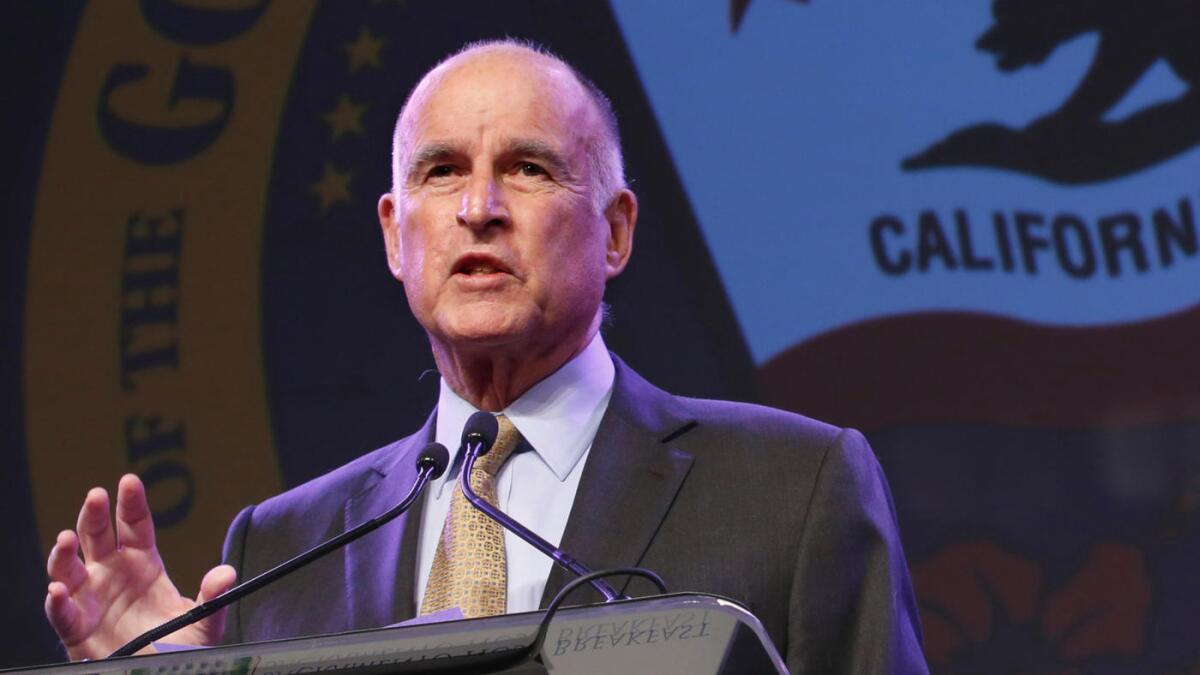
Continuing his tradition of giving pre-Christmas reprieves, Gov. Jerry Brown granted 112 pardons and commuted one sentence on Friday.
The pardons were granted mostly to individuals convicted of nonviolent, drug-related crimes who have since completed their sentences.
Since 2011, Brown has granted 854 pardons and two commutations, according to the governor’s office. That far exceeds recent predecessors such as former Gov. Arnold Schwarzenegger, who granted 15 pardons; Gov. Gray Davis, who granted zero pardons; and Gov. Pete Wilson, who granted 13.
Among those receiving pardons was Gwendolyn Irene Harvey, who was sentenced in February 1988 in Los Angeles for robbery and possession of a controlled substance for sale, and served more than three years. Brown noted in his pardon message that Harvey co-founded an organization that advocates for those in substance abuse programs.
Brown also shortened, but not did not eliminate, the sentence of Louis Calderon, who was convicted of attempted murder, with an enhanced sentence for use of a firearm, for being an accomplice in a 1999 gang-related shooting in which a victim lost an eye. Calderon was sentenced to a total prison term of 32 years to life.
Calderon has broken ties with his gang and has never been disciplined for a rule violation in 18 years, Brown noted. Calderon also earned multiple community college degrees and a paralegal certificate while in prison.
“This is a very serious crime, but it is clear that Mr. Calderon has distinguished himself by his exemplary conduct in prison and his forthright and continuing separation from gang activities of any kind,” Brown wrote. He reduced Calderon’s sentence to a total of 22 years to life.
- Share via
Necessary evidence or privacy intrusion? This bill is trying to expand DNA evidence collection in California
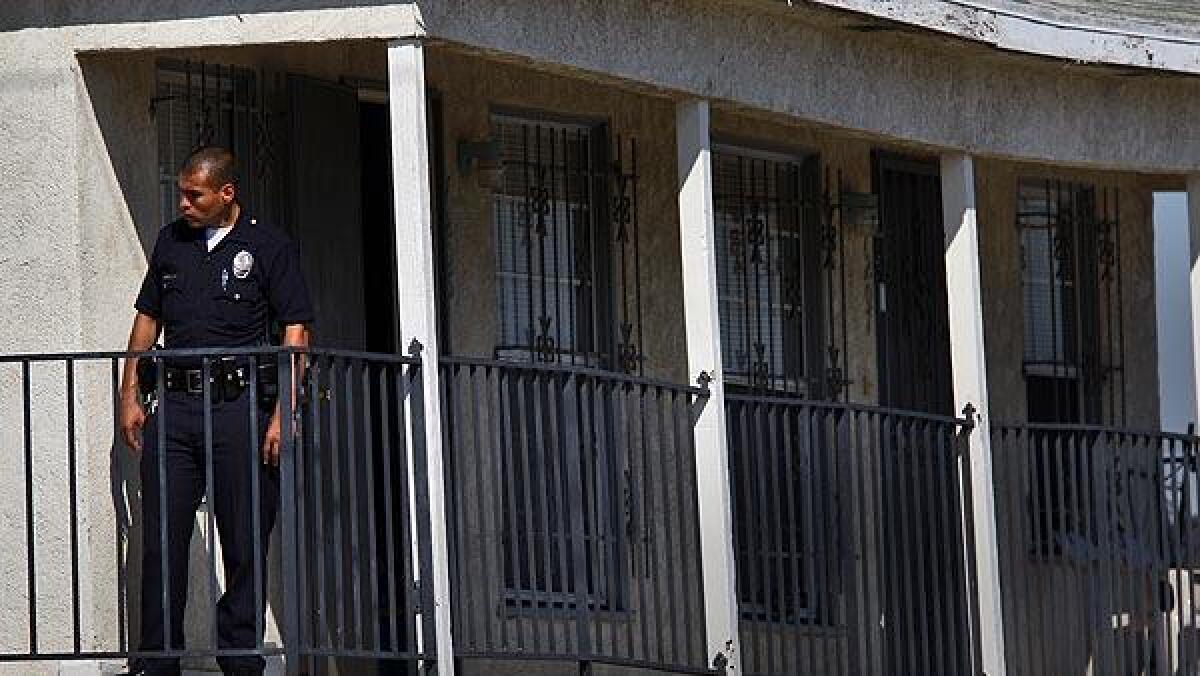
California lawmakers say they are trying to address an unintended consequence of making theft and drug crimes misdemeanors: a drop in the collection of DNA evidence they say is hurting cold-case investigations.
A bill reintroduced by Assemblyman Jim Cooper (D-Elk Grove) would order investigators to gather swab samples, blood specimens and fingerprints from people convicted of certain misdemeanors. Current law requires law enforcement to gather such evidence only from felons.
Supporters of Assembly Bill 16 point out that many of the crimes listed were considered felonies before Proposition 47 downgraded drug possession and some theft charges. But civil rights advocates say the proposal could have serious privacy implications.
- Share via
Barbara Boxer letter to The Times: ‘Our democracy depends’ on holding new leaders accountable
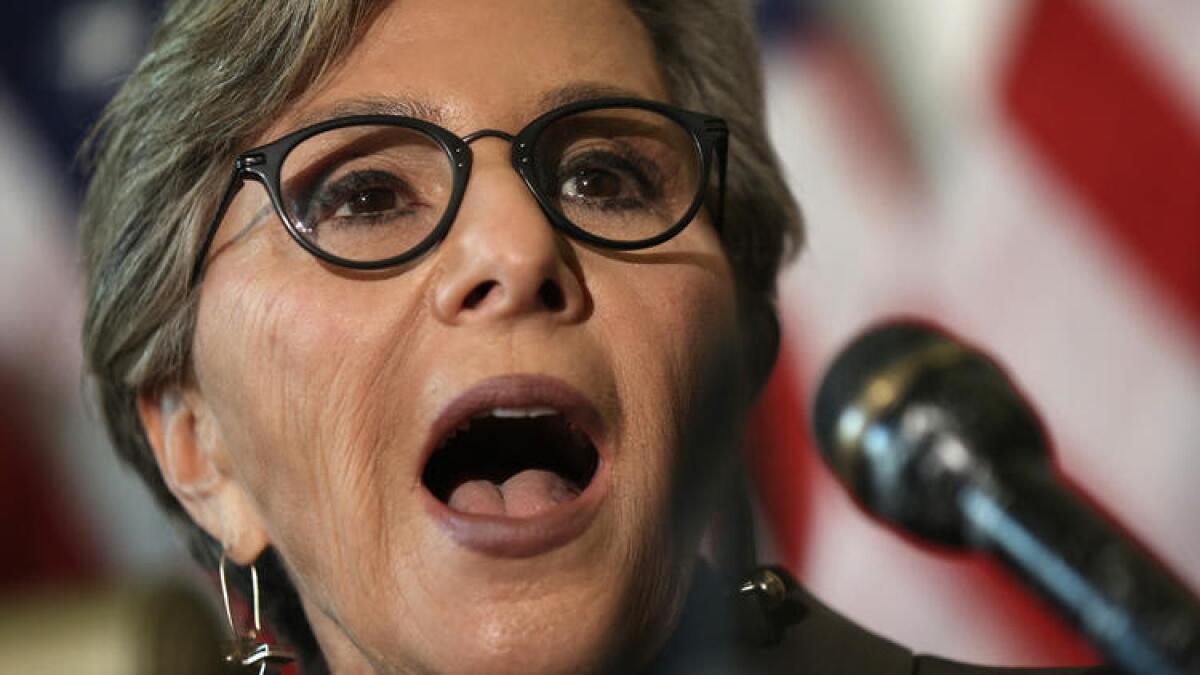
Sen. Barbara Boxer, in a farewell letter to the editor, warned of threats faced by the media under incoming President Donald Trump, and urged the media to hold him accountable.
She ended her decades in Washington earlier this month sparring with others from California over a water measure and defending politics as a “noble” profession.
Here’s an excerpt from her letter to The Times.
Going forward, I intend to remain very involved in the issues we face, and like all your readers, I will rely on the work you do every single day. As we march into uncharted territory with a new president-elect who has never held elected office — and who at times has threatened the media — the role of the free press is more important than ever.
- Share via
Extending California family leave law to smaller businesses is on the legislative agenda
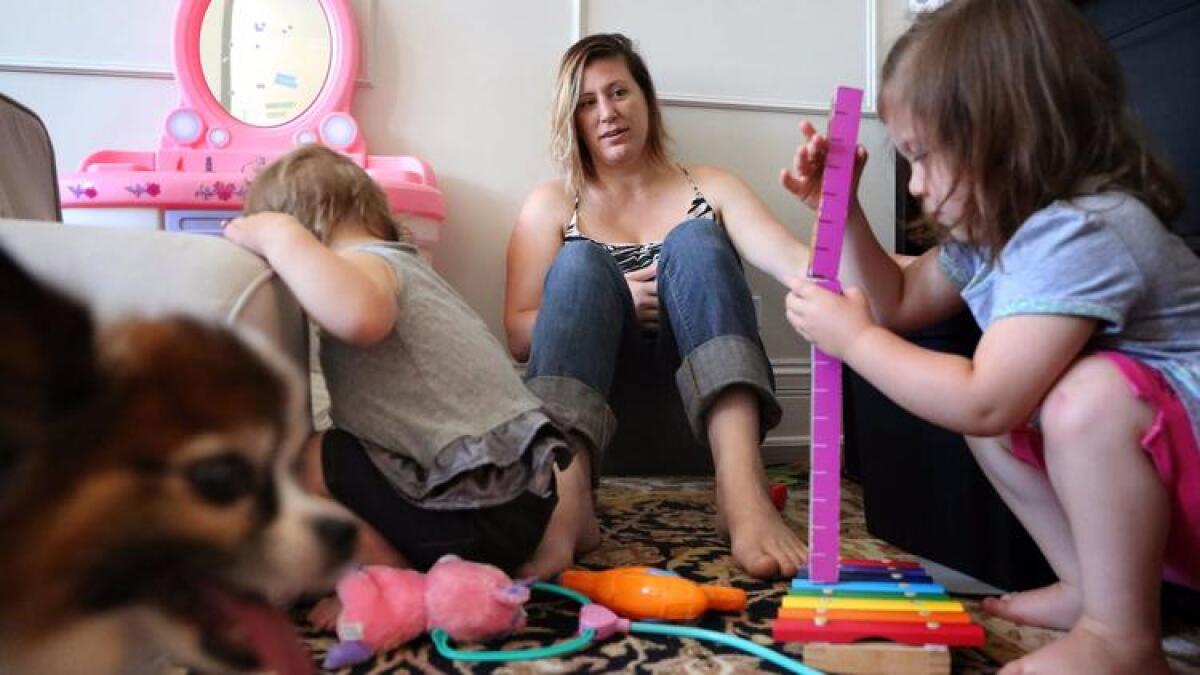
Sen. Hannah-Beth Jackson is once more seeking to extend family leave laws to some of the smallest businesses in California — and this time she hopes to give families more protected time off.
Jackson (D-Santa Barbara) has reintroduced the New Parents Leave Act, which Gov. Jerry Brown vetoed last legislative session, citing concern over the proposal’s effect on small businesses and the liability issues it could raise.
Senate Bill 63, which is substantially similar to its predecessor, would allow parents at companies with 20 to 49 employees to take time off to care for a newborn or newly adopted child without fear of losing their jobs. But the new version of the act would grant parents a period of 12 weeks protected job leave instead of six.
Jackson also reintroduced a second bill identical to another vetoed by Brown that would expand the definition of a family member in the law. The proposal would grant employees 12 weeks of family leave to care for a grandparent, grandchild, sibling, parent-in-law or adult child.
Current state laws extend such job protections only to those workers at businesses with 50 or more employees.
The bills were a priority of the California Legislative Women’s Caucus last legislative session. In a statement, Jackson said she looked forward to continuing to work with the governor on “an issue of national importance.”
- Share via
California’s five most expensive House races
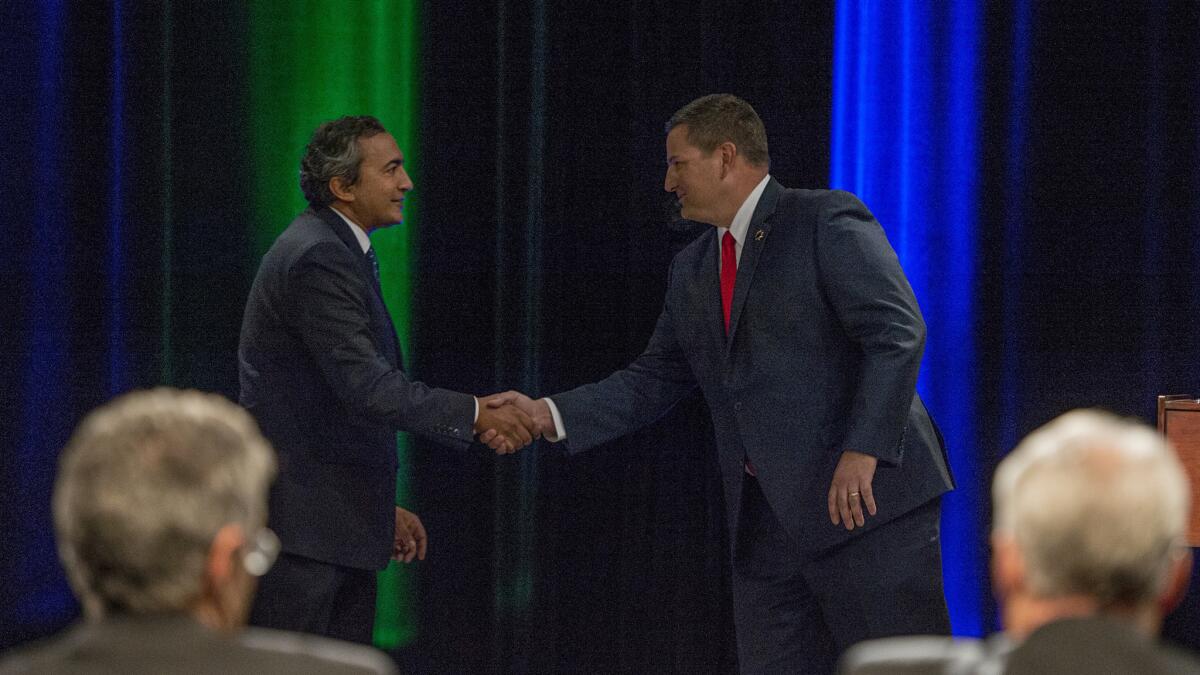
Winning a seat representing a California congressional district is not a cheap endeavor.
In the last two years, more than $150 million was spent trying to help or hurt the candidates running for one of California’s 53 seats in the House of Representatives.
Most of that money — about $117 million — was spent by the candidates’ own committees, while an additional $35 million poured in from outside groups looking to influence the outcome of a few key races.
California’s most expensive House races included some perennially contested seats as well as sleepy districts that were suddenly thrust into competition based on hopes that having Donald Trump at the top of the GOP ticket would imperil incumbent House Republicans down the ballot.
- Share via
Former White House aide, also a former L.A. Times employee, joins candidates vying to succeed Xavier Becerra
Former White House staffer Alejandra Campoverdi has entered the race to replace Rep. Xavier Becerra (D-Los Angeles).
Campoverdi, a former employee of the Los Angeles Times, said in an interview that her California upbringing and experience in Washington make her well-suited to represent the 34th Congressional District.
“I have a personal connection to the struggles of the people in this district, and I know how Washington works,” said Campoverdi, 37, who grew up in Santa Monica. “I was raised by a single mother who emigrated from Mexico and by my grandmother. Every day I saw the sacrifices they made for our family and for the community.”
Campoverdi worked in the White House from 2009 to 2012, first as an assistant to a deputy chief of staff and later as deputy director of Hispanic media.
While at The Times in 2015, she worked with the publisher’s office on a video project about immigration and the American identity. She left in July to pursue opportunities with other media outlets.
Campoverdi strikes a similar tone to many of her fellow candidates, vowing to “stand up against Donald Trump and his politics of hate.”
Other candidates vying for the seat include:
- Assemblyman Jimmy Gomez (D-Los Angeles)
- Wendy Carrillo, a Democratic labor activist
- Kenneth Mejia, a Green Party candidate who ran earlier this year as a write-in Democratic candidate against Becerra
- Sara Hernandez, former staffer for Councilman Jose Huizar and a Democrat
- Arturo Carmona, a Democrat and former top deputy for the Bernie Sanders campaign
- Yolie Flores, a former LAUSD board member and a Democrat
- Karl Siganporia, a Republican who previously explored a congressional run as a Democrat
- Raymond Meza, a Democrat and labor organizer with SEIU Local 721
- Steven Mac, a Democrat and felony prosecutor for Los Angeles County
UPDATE
9:40 a.m.: This post was updated to include Steven Mac’s entry into the race.
- Share via
Prosecutor is ninth candidate in L.A. congressional race to replace Becerra
The number of candidates fighting to replace Rep. Xavier Becerra is now at nine, with L.A. County prosecutor Steven Mac the latest to jump in.
Mac, 35, filed papers with the Federal Election Commission on Wednesday. He previously lived in Glendale, but moved to Eagle Rock this week due to rising rent, he said.
In an interview, Mac said that he was running to “hold the [Trump] administration accountable for the truth” and that his past experience as an active-duty Army intelligence officer and Judge Advocate General’s Corps officer has helped him prepare for that.
Mac, whose parents emigrated from Vietnam but are ethnic Chinese, was raised in South Los Angeles and later in Montebello. He says he understands the immigrant experience that permeates the lives of many residents in the 34th Congressional District: His mother worked in the garment district in downtown Los Angeles, while his father worked in Chinatown restaurants for years.
“No matter what country you come from, you come here and you start from nothing and work your way up,” he said. “I think I share that with everybody in the district.”
- Share via
Union organizer announces run for Xavier Becerra’s congressional seat
Raymond Meza, a Los Angeles union organizer, says he will join several other declared candidates vying to replace Rep. Xavier Becerra (D-Los Angeles).
In a video statement released Wednesday morning, Meza characterized himself as someone “with a proven track record of taking on opponents” and said he “isn’t afraid of a fight.”
In a written statement, Meza added that he “will refuse to compromise with Donald Trump” on issues such as immigration and dismantling the Affordable Care Act.
Meza, who was raised in Eagle Rock, has worked for the Service Employees International Union Local 721 for nearly a decade. The union was central to the “Fight for $15” campaign that helped bring a $15 minimum wage to Los Angeles County.
Meza joins seven other candidates — five Democrats, a Republican and a Green Party candidate — who say they are running to replace Becerra, who is expected to be confirmed as California attorney general early next year.
No date has yet been set for the special election to determine Becerra’s successor.
------------
FOR THE RECORD
4:43 p.m.: An earlier version of this post said six Democrats and a Republican were running to replace Xavier Becerra’s House seat. In fact, five Democrats, one Republican and one Green Party candidate are in the race.
------------
- Share via
CalPERS leaders push a plan to assume less from investments, more from taxpayers
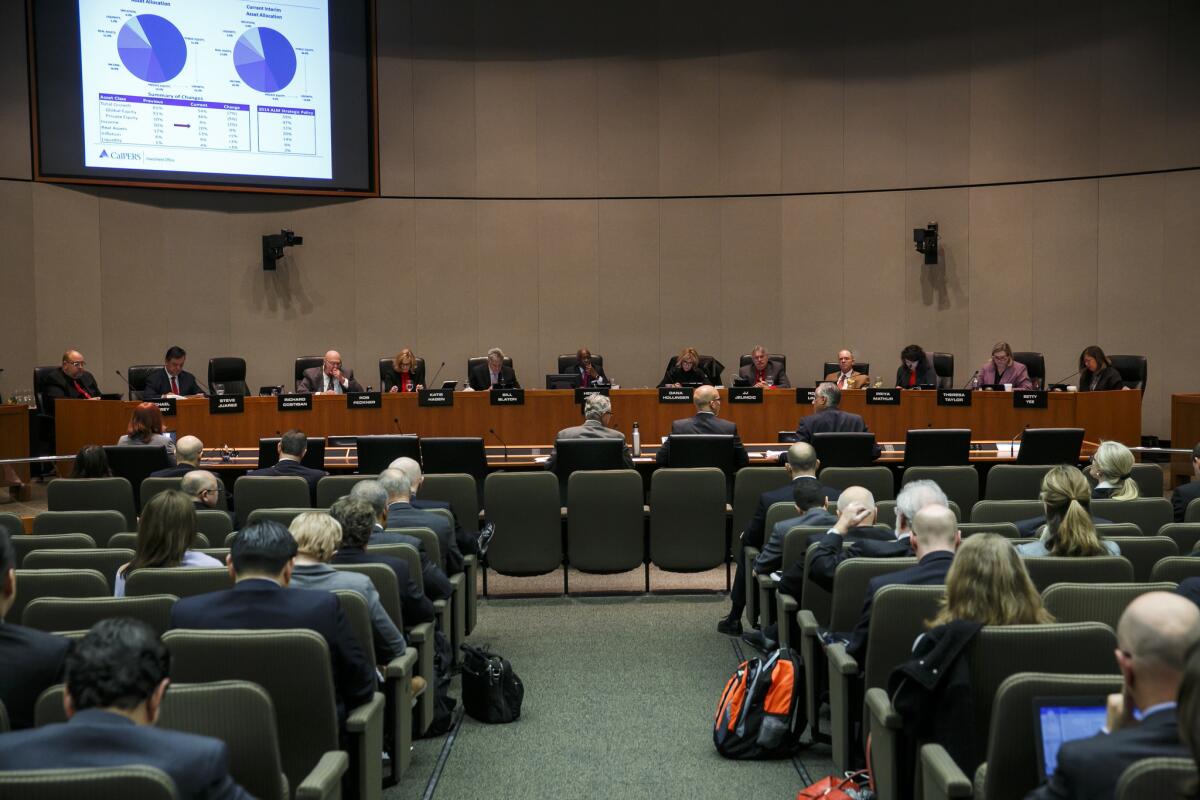
The investment committee of California’s largest pension fund took action Tuesday to lower long-term investment projections beginning next summer, a decision requiring larger annual contributions from taxpayers.
The proposal will be considered by the full board of directors of the California Public Employees Retirement Fund, CalPERS, on Wednesday. The proposal would take three years to fully implement, lowering the official rate of return on pension investments from the current 7.5% to 7%.
Ted Eliopoulos, the chief investment officer of CalPERS, told directors that the pension fund needs “additional cash to close the growing gap between benefits going out, and contributions coming in.”
CalPERS officials said that the 7.5% rate of return, which was put in place four years ago, could be achieved only by moving more of the fund’s $299-billion portfolio into real estate and private equity investments — the kinds of commitments that would take up dollars now being used to pay benefits to retired government workers.
“That’s just not practical, reasonable or prudent,” said Allan Emkin, an investment consultant asked to analyze CalPERS’ options.
Under the plan, the three-year transition to a lower investment assumption would be delayed an additional year for schools and local governments. A member of Gov. Jerry Brown’s budget staff said the action would require as much as $2 billion in annual state payments by the time of full implementation in 2020.
“We believe this schedule would give [government] employers time to plan their budgets and minimize the impact,” said Cheryl Eason, the chief financial officer of CalPERS.
Representatives of public employee unions, who criticized the more conservative approach in a pension fund meeting last month, warned of the costs to government workers who will be required to contribute more from their paychecks.
“Nobody has the crystal ball to project the future,” Jai Sookprasert of the California School Employees Assn. said to pension board members. “We believe this action you are about to take will have a major impact on employees and employers.”
Investment advisors told the pension fund leaders that under current economic conditions, there could be as little as a 14% chance of CalPERS’ achieving its current investment expectations over the next decade given the amount of money being paid each year to a rising number of retired government workers.
Last year, CalPERS paid out $5 billion more in retirement payments than it took in as employee contributions, a reflection of the quickly aging worker population.
“We are at this very painful, unique moment in time,” CalPERS board member Priya Mathur said. “We have been entrusted by employers to deliver the pension promises that they make to their employees.”
- Share via
L.A. County politicians and donors had the most campaign law violations in California this year
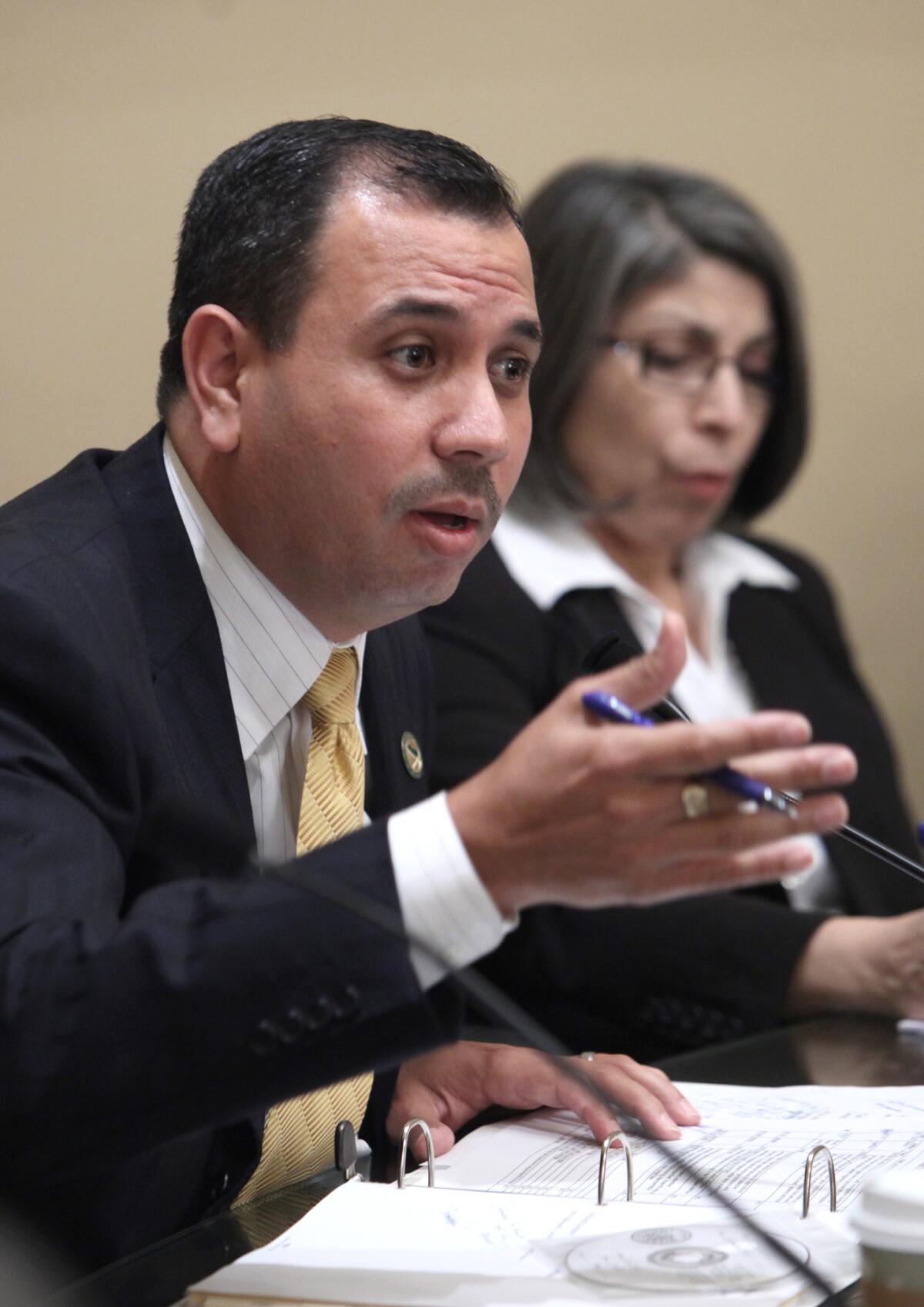
Los Angeles County had more cases of politicians and others successfully prosecuted for violating campaign finance and ethics rules than any other county in California this year, the state Fair Political Practices Commission reported Tuesday.
The agency prosecuted 72 cases this year from Los Angeles County, many more than the 23 in Santa Clara County, the second-highest number of violations among the 58 counties. The FPPC prosecuted 13 cases each in Orange and Ventura counties, 12 in Kern County, seven in Riverside County and six in San Bernardino County, according to an interactive map posted by the state ethics watchdog agency.
“We are always striving to improve our technology to increase transparency,” said FPPC Chair Jodi Remke. “The heat map will help inform voters and strengthen accountability.”
In all, the FPPC successfully prosecuted 311 cases statewide this year with penalties totaling $894,257, she said.
The largest fine involving a Los Angeles County politician was $57,000 levied by the FPPC against state Sen. Tony Mendoza (D-Artesia) in a case involving campaign money laundering and other violations in aiding a political ally.
- Share via
Buddhist reverend is newest chaplain for California Assembly
Monday’s gathering of the California electors featured formalities only trotted out every four years. But the proceedings began with two sounds that will likely be Capitol staples next year: a ringing Buddhist prayer bell and the distinctive baritone voice of Rev. Bob Oshita.
The 67-year-old is the newest Assembly chaplain. He most recently was reverend of the Buddhist Church of Sacramento.
Oshita, who also presided over the swearing-in ceremony for legislators earlier this month, began his opening prayer on Monday with the crisp chime of a bell and a call for “calming self-reflection.” His urging of introspection lent an air of solemnity to the ceremony, during which all 55 of California’s electors cast votes for Hillary Clinton.
“The greater the responsibilities of leadership, the more there is a need for deep and quiet reflection in each day,” Oshita told the electors.
Oshita and his wife, Patti, for decades have been involved with their church, which has been a longtime centerpiece of the local Japanese American community, the Sacramento Bee reported. He offered the opening prayer when the Dalai Lama addressed a joint session of the Legislature last June.
Asian Americans in the Legislature cheered Oshita’s appointment when it was announced earlier this month.
“His experience working with young people, tending to the spiritual needs of a variety of communities, and serving for many years in the [capital] city as a compassionate and committed reverend will serve us well in his new role,” Assemblyman Rob Bonta (D-Alameda), chairman of the Asian Pacific Islander Legislative Caucus, said in a statement.
The new chaplain replaces Father Constantine Pappademos, a Greek Orthodox priest who served various roles at the Capitol, including Assembly chaplain from 2003 until this year. Oshita’s counterpart in the Senate is Sister Michelle Gorman, a Roman Catholic nun who has served in the role since 2014.
FOR THE RECORD:
3:10 p.m.: A previous version of this post misspelled the last name of former chaplain Father Constantine Pappademos as Pappedemos.
- Share via
The state tax break for second homes is being targeted by lawmakers
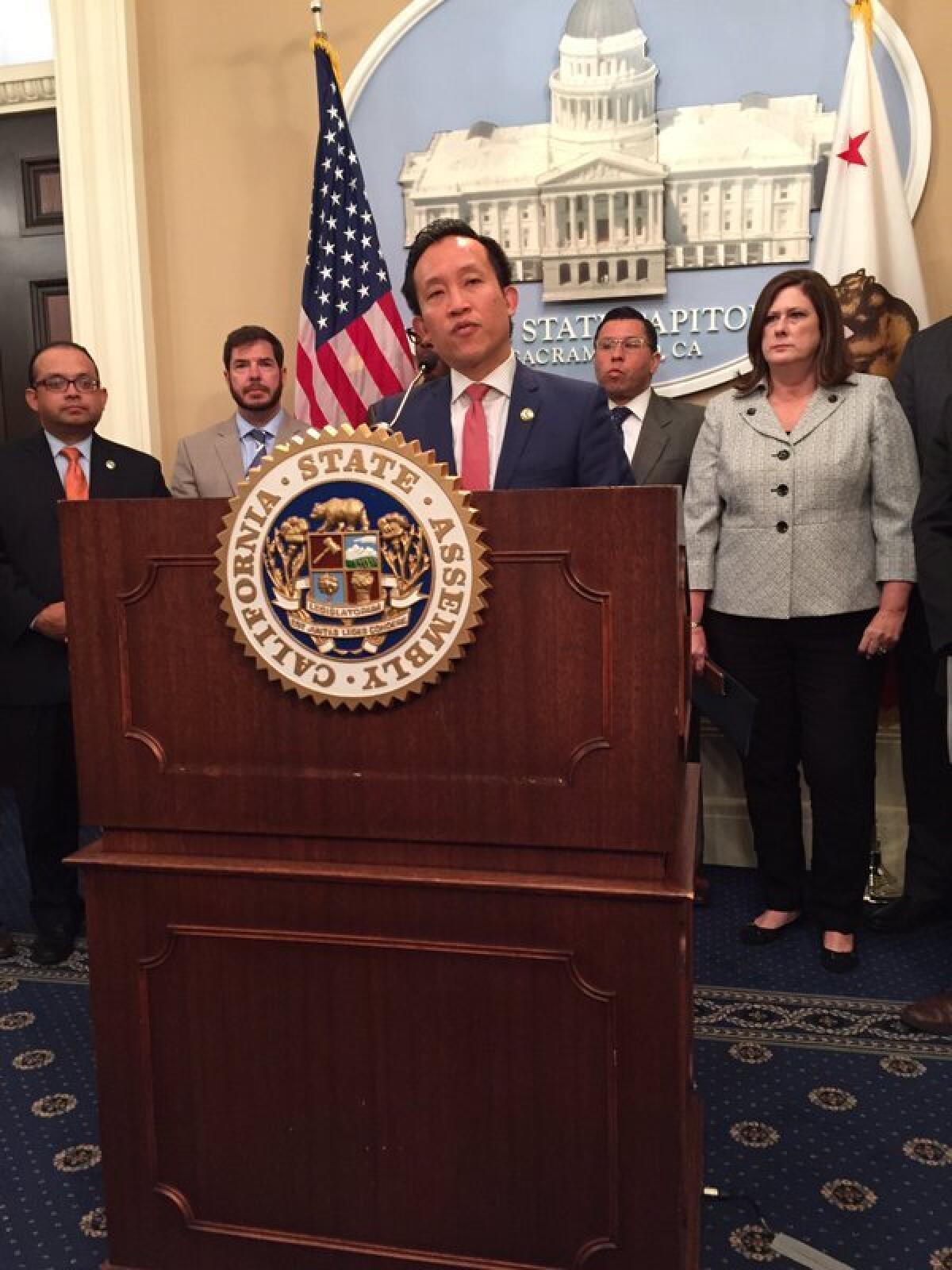
Following a year without major legislation to address California’s housing affordability crisis, state lawmakers have already introduced a number of bills designed to increase spending on low-income housing and boost production.
One proposal from Assemblyman David Chiu (D-San Francisco) would eliminate the state’s mortgage interest deduction on Californians’ second homes and redirect $300 million a year to tax credits that support low-income development.
The measure would require two-thirds approval in the Legislature and is a test of lawmakers’ long history of supporting tax subsidies for homeowners.
- Share via
California secession organizers say they’ve opened an embassy -- in Moscow
California gained an embassy in Russia last weekend, at least in the eyes of those who have promised to seek a statewide vote on secession, nicknamed “Calexit,” in 2018.
Louis Marinelli, a San Diego resident who is the leader of the group promoting an effort to turn the state into an independent country, organized the Moscow event that was publicized on social media.
“We want to start laying the groundwork for a dialogue about an independent California joining the United Nations now,” he said in an email Monday.
Marinelli is currently working as an English teacher in Russia, and said he is there working on immigration issues related to his wife, who is a Russian national.
The effort faces the longest of odds, requiring not only initial approval by California voters in 2018 but a subsequent special election in 2019. Even if successful then, the proposal would have to pass difficult if not insurmountable legal obstacles.
Marinelli said he’s not discouraged by the high hurdles.
“All major social and political movements in this country take time and inevitably have to overcome failures and setbacks before they are ultimately successful,” he said.
Secessionists formally launch quest for California’s independence
Big-city mayors oppose ‘Calexit’ secession effort
- Share via
California members of Congress petition Trump on climate change and abortion restrictions
Two members of the California congressional delegation, along with other lawmakers, wrote letters to President-elect Donald Trump this week, one warning him against targeting scientists researching climate change and another asking him to eliminate restrictions on federal money being used to provide abortions.
Responding to news that the Trump transition team requested detailed information about scientists working on climate change in Department of Energy national lboratories, Rep. Eric Swalwell (D-Dublin) led a letter signed by 26 colleagues warning that the members of Congress would defend the scientists in court if necessary.
Swalwell’s district includes Lawrence Livermore National Laboratory and Sandia National Laboratory. Four national laboratories in California employ 22,500 people, according to the Energy Department.
Trump has said he’s not convinced that climate change is real. The Trump transition team said the team member who had requested the information has since been disciplined.
“Such questions about [Department of Energy] lab staff are worrisome because they suggest there may be attempts by the incoming Administration to retaliate against them or defund their work, even if blame for the questionnaire is now said to rest with a reportedly ‘rogue’ transition team employee,” the letter states. “Regardless of one’s views on climate change, it is simply inappropriate to target hard-working public servants simply for doing their jobs.”
Facing another two years as the minority party in the House and Senate, letters signed by a few dozen colleagues is a way for Democrats to draw attention to policy issues, especially with a Republican also controlling the executive branch.
Rep. Barbara Lee (D-Oakland) led a letter signed by more than 100 House colleagues urging Trump not to include 1976 Hyde Amendment in his 2018 budget. The amendment, when invoked, prevents federal funds from being used to pay for abortions.
“Every person should be treated with dignity, compassion and respect — and that includes a woman’s right to make her own decisions about whether to end a pregnancy. We urge you to begin your presidency with a clear and bold statement that abortion coverage bans have no place in our public policy,” the letter states.
Over the years, the Hyde Amendment restriction has been used for those on Medicare and Medicaid, federal employees, Peace Corps volunteers, female prisoners and others who receive federally funded healthcare. Many of those people have low incomes and are minorities, the letter states.
During the campaign, Trump said he was “totally against abortion” He also said that “there has to be some form of punishment” for women who get an abortion if it were outlawed, a statement his campaign quickly walked back.
- Share via
If you’re from this Redlands district, here’s how to get your Trump inauguration tickets
- Share via
Kamala Harris nabs national security, environment assignments in the U.S. Senate
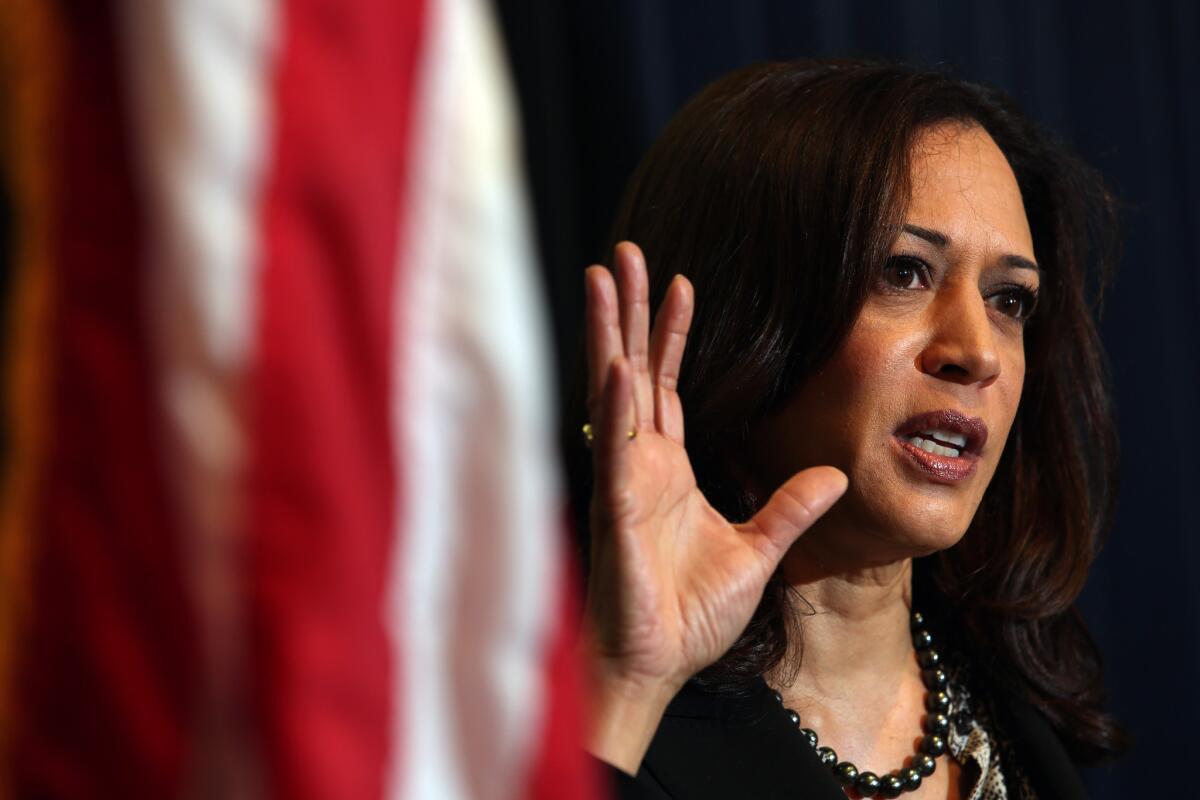
Sen.-elect Kamala Harris said Monday that her committee assignments in the U.S. Senate will be “key battlegrounds” in next year’s major policy debates on Capitol Hill.
The incoming freshman Democrat will serve on the Homeland Security and Governmental Affairs Committee; the Select Committee on Intelligence; the Committee on Environment & Public Works; and the Committee on the Budget.
In a written statement, Harris said she believes the four committees will be tasked with examining a number of the proposals promoted by the incoming administration of President-elect Donald Trump.
“At a time when so many Californians and Americans are uncertain about our future, I will aggressively fight for our families and the ideals of our nation,” Harris said.
- Share via
Anti-Trump protesters gather in Sacramento for the electoral college vote
California’s 55 presidential electors will cast their votes at the state Capitol on Monday afternoon. For coverage of the events in Sacramento and state capitals across the country, follow the latest news on Trail Guide.
- Share via
Lawmakers say Trump should disclose tax returns to get on California’s 2020 ballot
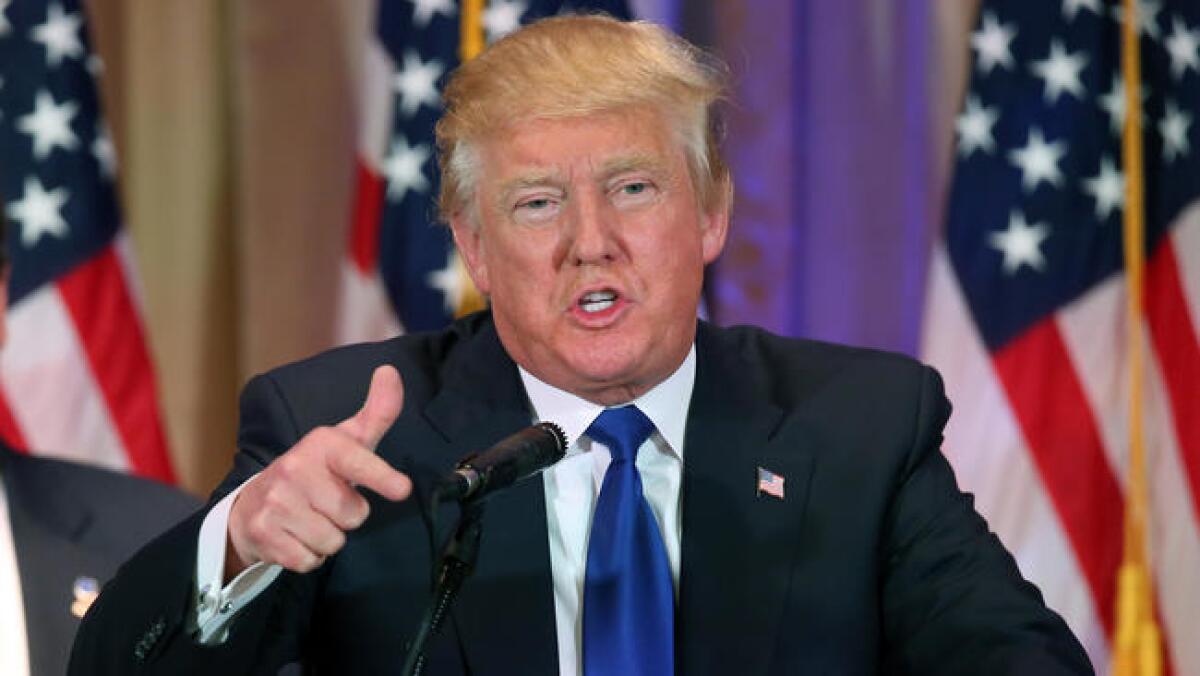
President-elect Donald Trump would have to disclose his tax returns to the public to win a spot on California’s statewide ballot in 2020 under a plan two lawmakers will introduce in Sacramento.
The legislation is inspired by a similar effort in New York and would require any candidate to disclose five years of tax returns no later than 50 days before a general election.
“Transparency is a non-partisan issue,” said state Sen. Mike McGuire (D-Healdsburg) in a statement. “Voters not only deserve full disclosure of their future leader’s tax returns, they should be entitled to them.”
The refusal by the president-elect to release his tax returns broke a streak for candidate disclosure that dated back four decades. The efforts in California and New York seek to force candidates to comply by using election law.
“Requiring that this basic financial information be made available to voters will help build critical public trust,” said state Sen. Scott Wiener (D-San Francisco), the co-author of the legislation.
- Share via
California Politics Podcast: Gov. Jerry Brown takes on climate science critics
Gov. Jerry Brown is wasting no time in drawing a line on the issue of climate change with the incoming administration of President-elect Donald Trump.
This week’s episode of the California Politics Podcast takes a closer look at the governor’s comments last week in San Francisco — a speech in which he made clear California is prepared to go it alone on climate policies if needed.
And in this last episode of 2016, we offer a few key takeaways from the year in California politics as well as what role those issues might play in the debates of 2017.
I’m joined by Marisa Lagos of KQED News.
- Share via
Prominent California Republicans urge party members to keep Jim Brulte on as state GOP chairman
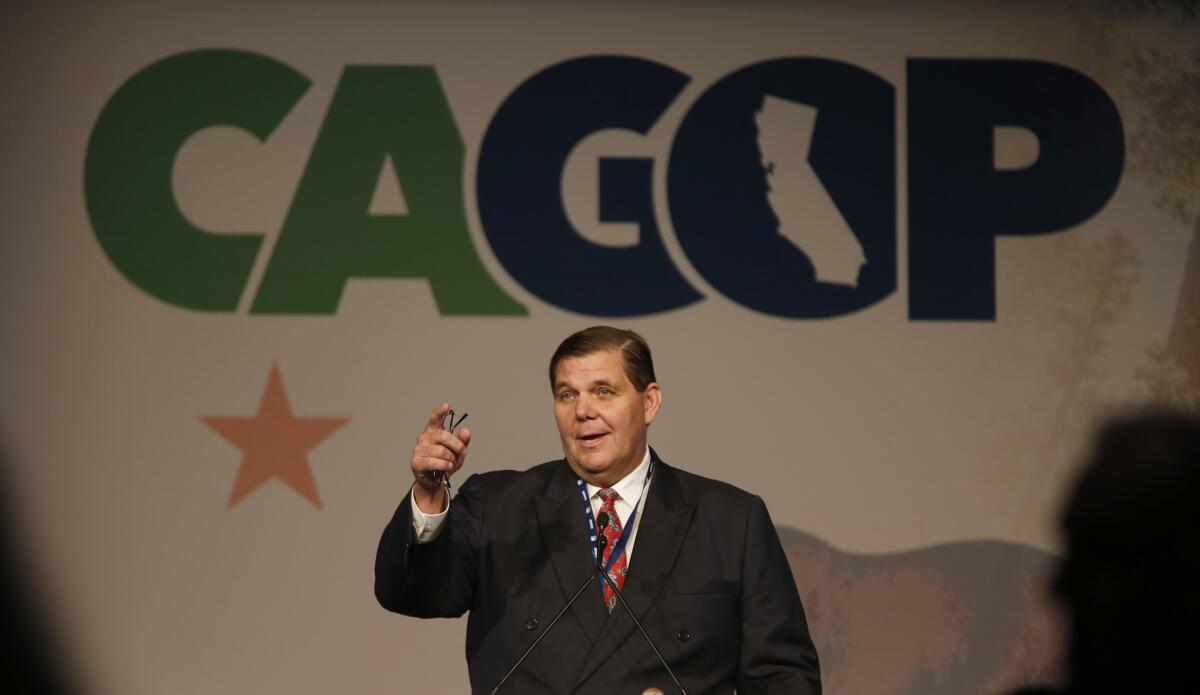
Three top California Republicans sent a letter Friday urging party members to retain state GOP Chairman Jim Brulte as the party looks toward statewide elections in 2018.
“It’s no secret that California’s demographic trends present challenges for the GOP,” read the letter, signed by Tim Clark, California director for the Donald Trump campaign; Ron Nehring, a former state GOP chairman; and Steve Poizner, who as state insurance commissioner from 2007 to 2011 was the last Republican to hold statewide office.
“Chairman Brulte understands that Republicans must focus, in the short term, on winning battles where we can, while also making permanent, long-term growth into California’s diverse communities,” the letter continued.
Brulte, a former state Senate Republican leader from Rancho Cucamonga, took over as chairman in 2013 at a time when the party was in disarray and in massive debt. He was reelected in 2015.
Earlier this year, party leaders voted to change party rules to allow Brulte to serve two more terms if reelected.
The chairmanship vote will take place during the state Republican spring convention, scheduled for Feb. 24-26 in Sacramento.
Times staff writer Phil Willon contributed to this report.
- Share via
California Secretary of State Alex Padilla certifies historic results in ‘smooth’ election
California Secretary of State Alex Padilla on Friday certified a record-breaking count of 14.6 million ballots cast statewide, calling the November 2016 election “smooth” and free of compromises or breaches.
Padilla, a Democrat who endorsed Hillary Clinton during the primary season, once more refuted a claim by President-elect Donald Trump of rampant voter fraud statewide, saying it was “absolutely false” and without basis or evidence.
He declined to speculate as to what could happen Monday, when the members of the electoral college across the nation cast their votes for president. But he said he hoped that process in California would go as smoothly as the general election.
“Bottom line, I can assure you that the elections officials at the state level and across all 58 counties pride themselves on professionalism,” he said. “We stand by the results. We stand by the process, and we stand by protecting people’s voting rights in California.”
Election results show Hillary Clinton won the state with 62.2% of the popular vote — 4.2 million votes over Trump, the largest margin of victory for a presidential candidate since 1936.
The last time California saw a record number of ballots cast was in 2008, when 13.7 million votes were counted. Registered voter turnout this November election reached more than 75%, with nearly 58% of voters casting their ballots by mail.
- Share via
California delegate to Republican National Convention pays a visit to Trump Tower
California may have overwhelmingly voted for Hillary Clinton, but Donald Trump still has passionate supporters from the state.
Shirley Husar, a Republican National Convention delegate from Pasadena, visited Trump Tower on Friday to talk about urban renewal with Omarosa Manigault, a Trump advisor and former “Apprentice” contestant.
Husar, who is African American, helped nominate Trump at the convention, calling him a “candidate that can provide for my boys and all Californians the hope and opportunity of the true America.”
Husar has criticized Black Lives Matter activists and the role of government assistance programs and she praised Trump in comments to reporters on Friday.
“We’re excited,” she said. “The African American coalition is growing.”
- Share via
Coming to the state Capitol on Monday: California’s 55 electors
The 2016 presidential campaign will finally come to an end Monday when the members of the electoral college across the nation cast their votes for president, reflecting the outcome of the Nov. 8 election.
While that action will officially seal the win for Donald Trump, in California, the ceremony will be decidedly centered around Hillary Clinton, whose decisive victory here helped power her lead in the nationwide popular vote.
She will be the choice of California’s 55 Democratic electors, who will convene at 2 p.m. in the state Capitol to cast their votes.
Because all of the state’s electoral votes go to the winner, the crowd gathering Monday will be entirely aligned with the Democrats -- a delegation chosen by the state’s two U.S. senators as well as congressional nominees in each district. A federal judge on Friday rejected a challenge to the state’s winner-take-all requirement.
The electors include Christine Pelosi, daughter of House Minority Leader Nancy Pelosi of San Francisco, and Olivia Reyes-Becerra, daughter of Rep. Xavier Becerra of Los Angeles, just selected to be the state’s next attorney general.
The group also includes elected officials such as Assemblywomen Shirley Weber of San Diego and Susan Talamantes Eggman of Stockton.
The Times will cover this meeting and the day’s electoral college events live.
- Share via
Former LAUSD board member enters the fray to replace Xavier Becerra
- Share via
California’s top elections officer says it’s past time to revisit the electoral college
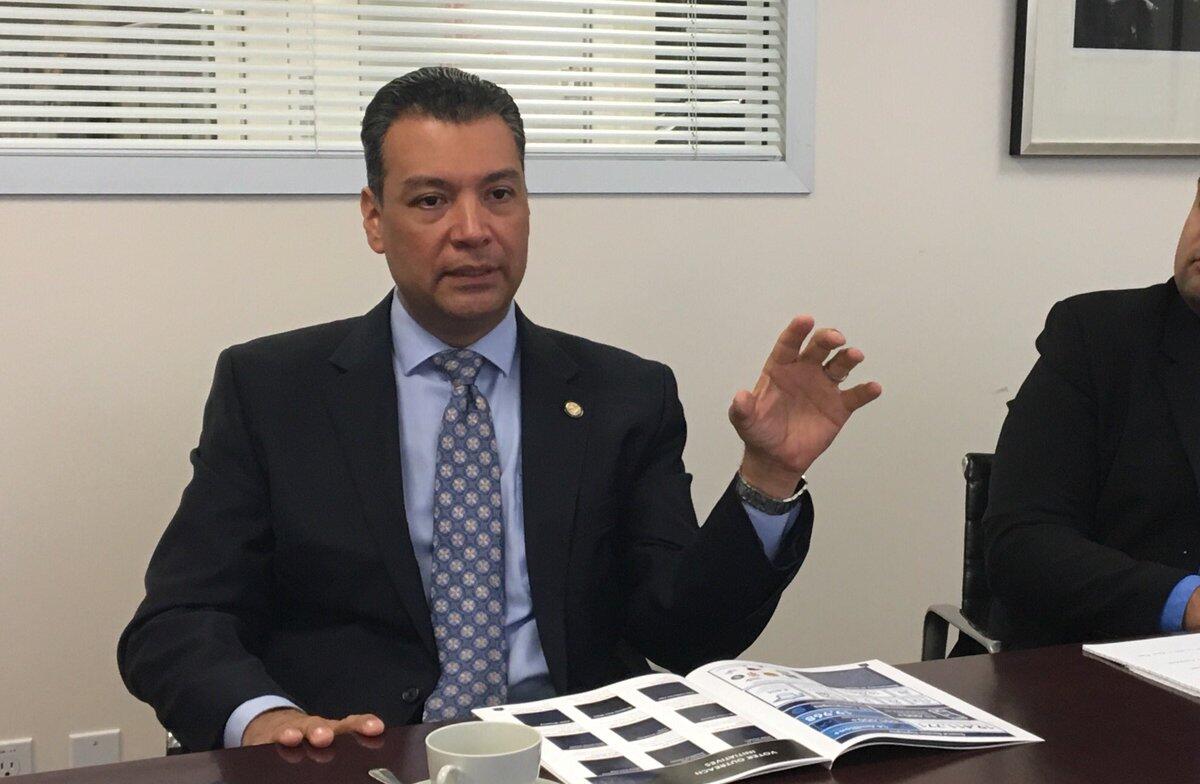
Secretary of State Alex Padilla, who will certify the results of the Nov. 8 election this week, said it’s wrong to consider overhauling some parts of federal voting law without also weighing the merits of the electoral college in the modern era.
“Is it past time to revisit the electoral college? Absolutely,” Padilla said Thursday in a meeting with The Times Editorial Board.
Padilla, a Democrat who endorsed Hillary Clinton during the primary season, took note of a 2013 U.S. Supreme Court decision to strike a portion of the 1965 Voting Rights Act, which a majority of justices saw as no longer needed.
“I can’t ignore the parallel,” Padilla said. “If the Supreme Court of the United States found that the formula for the Voting Rights Act, which was only 50 years old, no longer applied and was worth revisiting, why not the electoral college?”
Still, the state’s chief elections officer declined to say whether he thinks — as some have suggested — that presidential electors in states across the nation should be allowed to vote their conscience when they meet next week. California law requires the 55 electors chosen by Democrats to vote for the nominees of their party.
“I think the state law is pretty clear in California on what electors are supposed to do,” he said.
Padilla noted that California is part of an 11-state compact whose members have agreed to cast their electoral votes for the presidential candidate that wins the national popular vote. The compact has no legal effect, however, until enough state legislatures sign on and pass legislation binding their states to the agreement to total the 270 electoral college votes a candidate needs to become president.
------------
FOR THE RECORD
4:38 p.m. Dec. 17: A previous version of this post said presidential electors should be allowed to vote their conscience when they meet next year. They will meet next week.
- Share via
California bill declares all children have a basic right to quality education, healthcare and social services
State Sen. Richard Pan on Monday said all California children should have a basic right to quality childcare, early education and health and dental services no matter where they live or the income of their parents.
At a news conference held in the playground of the Discovery Tree School, the pediatrician and Sacramento Democrat unveiled the Children’s Bill of Rights, stating all children have the right to live in a just, safe, healthy and supportive society.
The proposal, sponsored by Common Sense Kids Action, states the Legislature’s intent to expand and formalize the rights of children and to work on legislation that aims to help families provide and care for their children.
No other state in the nation has established the rights of children to have their basic needs met. In California, parents, school officials and lawmakers have sought to build a consensus centered on the issue since 2009.
Parents scored a victory last legislative session when Gov. Jerry Brown signed a bill expanding California’s pioneering family-leave law.
But the Legislature has made little headway in building a coordinated effort. Parents and school officials said the children’s bill of rights is a step in that direction.
Pan and organizers will be holding town hall meetings statewide to ensure that the bill addresses crucial issues such as access to high-quality childcare, early childhood education and paid family leave.
- Share via
Assemblyman Jimmy Gomez racks up endorsements from Latino elected officials in fight for Becerra’s congressional seat
As other potential candidates have been weighing whether to jump in to the race to replace Rep. Xavier Becerra (D-Los Angeles), L.A. Assemblyman Jimmy Gomez has been busy rolling out endorsements from state and national Latino leaders.
Five members of the Congressional Hispanic Caucus have endorsed Gomez so far: Reps. Grace Napolitano (D-Norwalk), Pete Aguilar (D-Redlands), Juan Vargas (D-San Diego), Filemon Vega of Texas and Arizona’s Ruben Gallego.
Gomez already has support from state Senate leader Kevin de León of Los Angeles, Assembly Speaker Anthony Rendon of Paramount and L.A. County Supervisor Hilda Solis.
He also scored the backing of outgoing state Atty. Gen. Kamala Harris, who will be sworn in as U.S. senator next month.
On Wednesday, Gomez also announced the endorsement of L.A. City Councilman Gil Cedillo, who had previously considered running for the seat himself.
“This is not a training job,” Cedillo said at a press conference in Macarthur Park Wednesday. “This is a job where people...will be in the moment of crisis, whose voices must be heard, whose leadership must be demonstrated.”
- Share via
Assembly Republican leader doesn’t believe there’s widespread voter fraud in California
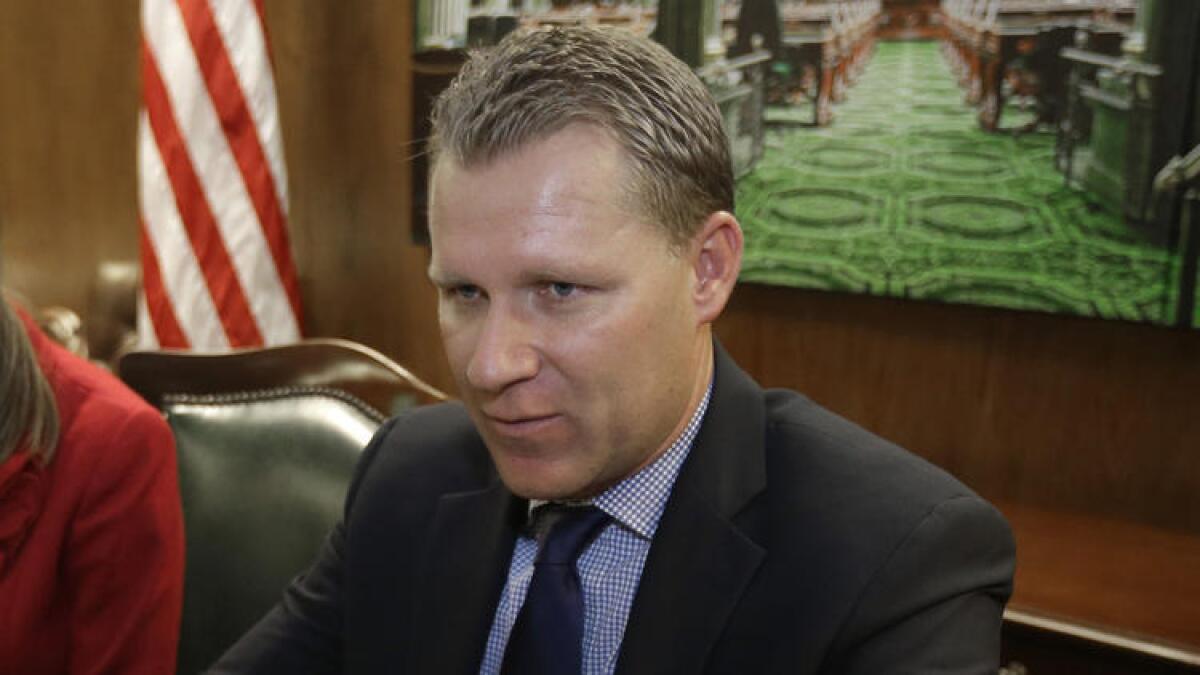
Contradicting claims made by President-elect Donald Trump, the state Assembly’s top Republican said Wednesday that he doesn’t believe there was rampant voter fraud in California on Nov. 8.
“I don’t think there’s widespread fraud in California,” said Assembly GOP leader Chad Mayes (R-Yucca Valley) in an interview with The Times in Sacramento.
In a Nov. 27 tweet, Trump alleged “serious voter fraud” in California and two other states — an allegation without any evidence to support it. It was the president-elect’s first and only comment about the results in California, which he lost to Hillary Clinton by almost 4.3 million votes.
Mayes, who declined to say how he cast his ballot for president, voiced concerns about reports of some isolated incidents involving either voting errors or mistaken registration. Republicans have demanded a new look, in particular, at the online voter registration site maintained by the secretary of state’s office.
“Do I think that there are other ways that folks try to game the system?” Mayes said. “Maybe. But I do think the people that vote, and if they’re legal to be able to vote, that their vote is cast appropriately and it’s counted appropriately.”
Mayes, who talked about priorities ranging from transportation to healthcare benefits, now leads a GOP caucus that has shrunk since the previous two-year session of the Legislature. Republicans now hold only 25 Assembly seats, a net loss of two lawmakers after Democrats won a supermajority of both houses.
But the Republican leader did not say he believed there was any evidence of a systemic problem that would undermine the integrity of California elections.
“From what I’ve seen, it’s been very clear that we’ve got a good system,” Mayes said.
- Share via
People who live in public housing would be banned from smoking and vaping in their homes under new bill

Residents of government housing would be barred from smoking and using electronic cigarettes inside their residential units and within 25 feet of buildings under legislation introduced by Assemblyman Jim Wood (D-Healdsburg).
The bill is one in several measures restricting tobacco use in California in recent years because of health concerns, and comes as the U.S. Department of Housing and Urban Development has drafted rules for a nationwide public housing smoking ban to be implemented in the next 18 months.
“This is a great step forward in protecting families by significantly reducing exposure to second-hand smoke and this bill codifies federal regulations,” Wood said. “In AB 62, we are taking it a step further by including the use of e-cigarettes to be consistent with California’s definition of tobacco products which includes e-cigarettes and other vaping products.”
The measure would give public housing agencies until July 30, 2018, to put smoking restrictions in place.
- Share via
‘We’re ready to fight.’ Gov. Jerry Brown unloads on Trump and climate issues
In perhaps his most fiery comments since Donald Trump won the presidency, Gov. Jerry Brown said on Wednesday California will push back against any effort to stop or reverse policies fighting global climate change.
“We’ve got the scientists, we’ve got the lawyers and we’re ready to fight,” Brown said to applause during a speech to the American Geophysical Union in San Francisco.
The governor has mostly held back in recent weeks from commenting on the potential policy changes promised by the president-elect during the campaign. But in the impassioned speech to a group of scientists, Brown lamented what he described as a “miasma of nonsense” on important issues facing the nation and world.
The only direct comment about the president-elect came in a reference to worries that climate research conducted by NASA could come to an end under the new administration. Brown reminded the crowd of the nickname he was given by a newspaper columnist in 1976, “Governor Moonbeam,” for his interest in a state-sponsored satellite.
“If Trump turns off the satellites, California will launch its own damn satellite,” roared Brown to the crowd.
And referring to Rick Perry, the former Texas governor Trump has selected to lead the Dept. of Energy, Brown reminded everyone of California’s advantages over Texas when it comes to renewable energy.
“We’ve got more sun than you’ve got oil,” he quipped.
- Share via
Former Bernie Sanders campaign aide Arturo Carmona enters race to replace Becerra
- Share via
L.A. Mayor Eric Garcetti talks to Chelsea Handler about his conversation with Trump
When it comes to dealing with Donald Trump, Los Angeles Mayor Eric Garcetti seems committed to walking a political tightrope: offering to work with Trump on some issues while pushing back on the president-elect’s immigration stance.
Garcetti discussed his phone conversation with Trump in an interview with television host Chelsea Handler that will be available to stream on Netflix early Wednesday. The pair talked about new infrastructure spending and the city’s Olympic bid.
“I encouraged him to work with us to figure out a way to fix the system instead of just going after the immigrants as scapegoats,” he said.
He was mum when asked how Trump replied.
“I always respect private conversations, but in broad terms, he said ‘I want to fix a broken system,’ so I think there was an opening there,” Garcetti said.
Perhaps channeling California Gov. Jerry Brown’s penchant for quoting philosophers, Garcetti urged those upset by the presidential election to pay more attention to local politics by repeating a quote attributed to French philosopher Ernest Renan: “The nation is a daily plebiscite.”
The interview ended with Garcetti thanking Handler for the gifts guests receive when they come on the show.
“Even for the boys, we get birth control pill cases that say ‘Chelsea,’” he said holding up a blue case. “That is very considerate, thank you.”
- Share via
Criticism is fierce over an effort to cancel California pension fund investments in tobacco

A pair of powerful California elected officials expressed outrage Tuesday at a recommendation that the state’s largest public employee pension fund cancel its ban on investing in tobacco companies.
A staff report from the California Public Employees Retirement System calls for the agency’s directors to abandon a 16-year effort to move away from tobacco-related securities. The report estimates there are about $547 million worth of investments related to tobacco in the CalPERS portfolio.
CalPERS staffers wrote that the existing policy has left pension fund managers in limbo, and that any effort to completely divest from the tobacco industry would be “tying the hands of investment staff, thereby severely hampering staff’s ability to re-evaluate and reinvest as market conditions warrant.”
Treasurer John Chiang, who sits on the CalPERS board, said Tuesday that the pension fund needs to make a complete break with tobacco investments.
“I continue to believe that investing in tobacco-related securities is a bad economic decision for CalPERS beneficiaries, for the state in general and for the world as a whole, whether we invest directly or through others,” Chiang wrote to the agency’s investment committee.
Lt. Gov. Gavin Newsom chimed in on Tuesday afternoon, calling any full cancellation of the ban on tobacco investments “about the most perverse course of action CalPERS can take.”
Both Chiang and Newsom have announced their plans to run for governor in 2018.
CalPERS’ board of directors is scheduled to consider the fate of tobacco investments on Dec. 19.
- Share via
Gov. Brown asks President Obama to permanently ban new drilling off California’s coast

Seeking swift action before the arrival of a new president, Gov. Jerry Brown urged President Obama on Tuesday to make permanent the existing ban on new oil and gas drilling along the California coast.
“Now is the time to make permanent the protection of our ocean waters and beaches,” wrote Brown in the letter released by his office. The governor later participated in a San Diego event to mark California joining a regional effort to combat ocean acidification.
Brown’s letter comes almost two weeks after a similar request by legislative Democrats. Whether Obama could act in a way that could not be revisited by President-elect Donald Trump next year remains unclear, though a growing chorus of Democrats and environmental activists are urging an attempt by the president before he leaves office.
The governor also raised the issue of climate change in his letter to Obama.
“Clearly, large new oil and gas reserves would be inconsistent with our overriding imperative to reduce reliance on fossil fuels and combat the devastating impacts of climate change,” Brown wrote.
- Share via
Oakland mayor searches for path forward in wake of deadly fire
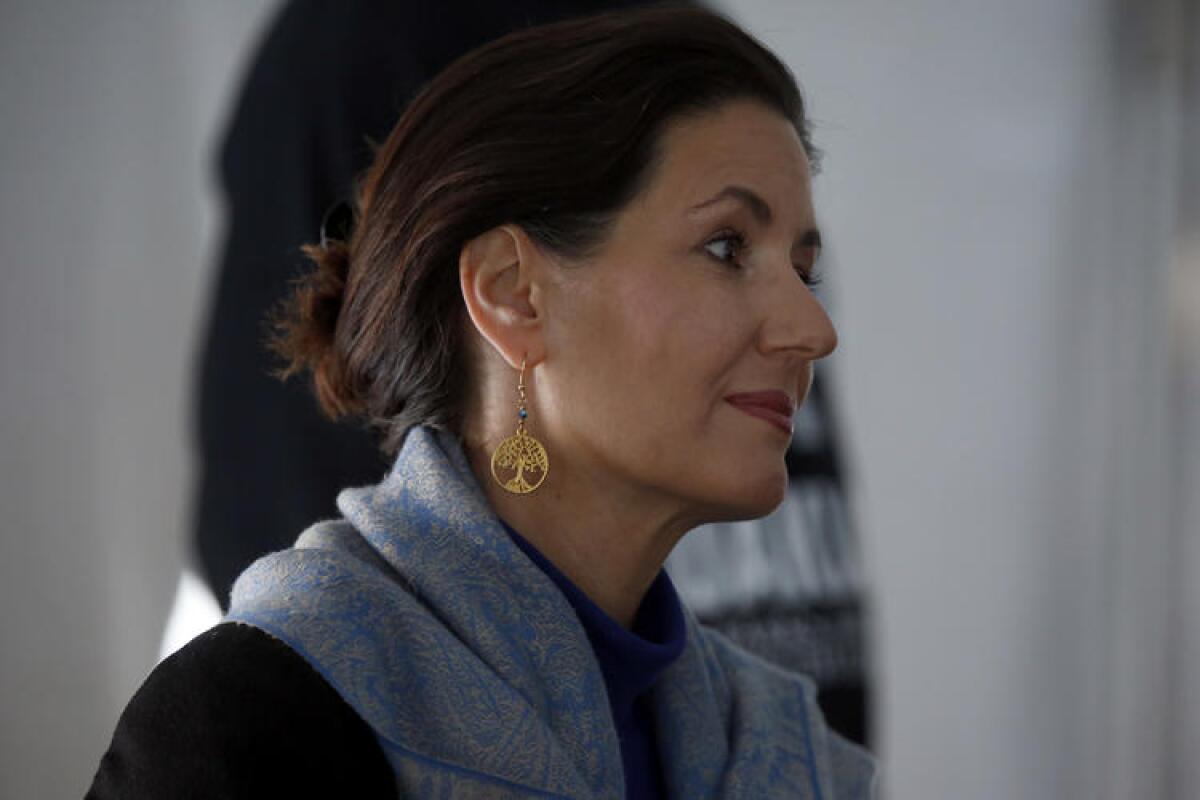
Being mayor of Oakland was never going to be an easy job. The city has struggled with crime, poverty and complex questions about how to adapt to the influx of wealth from the tech boom.
This is the situation Libby Schaaf inherited when she stepped into Oakland’s top job after winning the 2014 election, but it’s only gotten more difficult.
The Ghost Ship warehouse fire, which killed 36 people on Dec. 2, has become a tragic test for Schaaf’s administration as it tries to balance safety and affordability for residents.
- Share via
Taxpayers’ group sues Gov. Brown to overturn law allowing public financing of campaigns
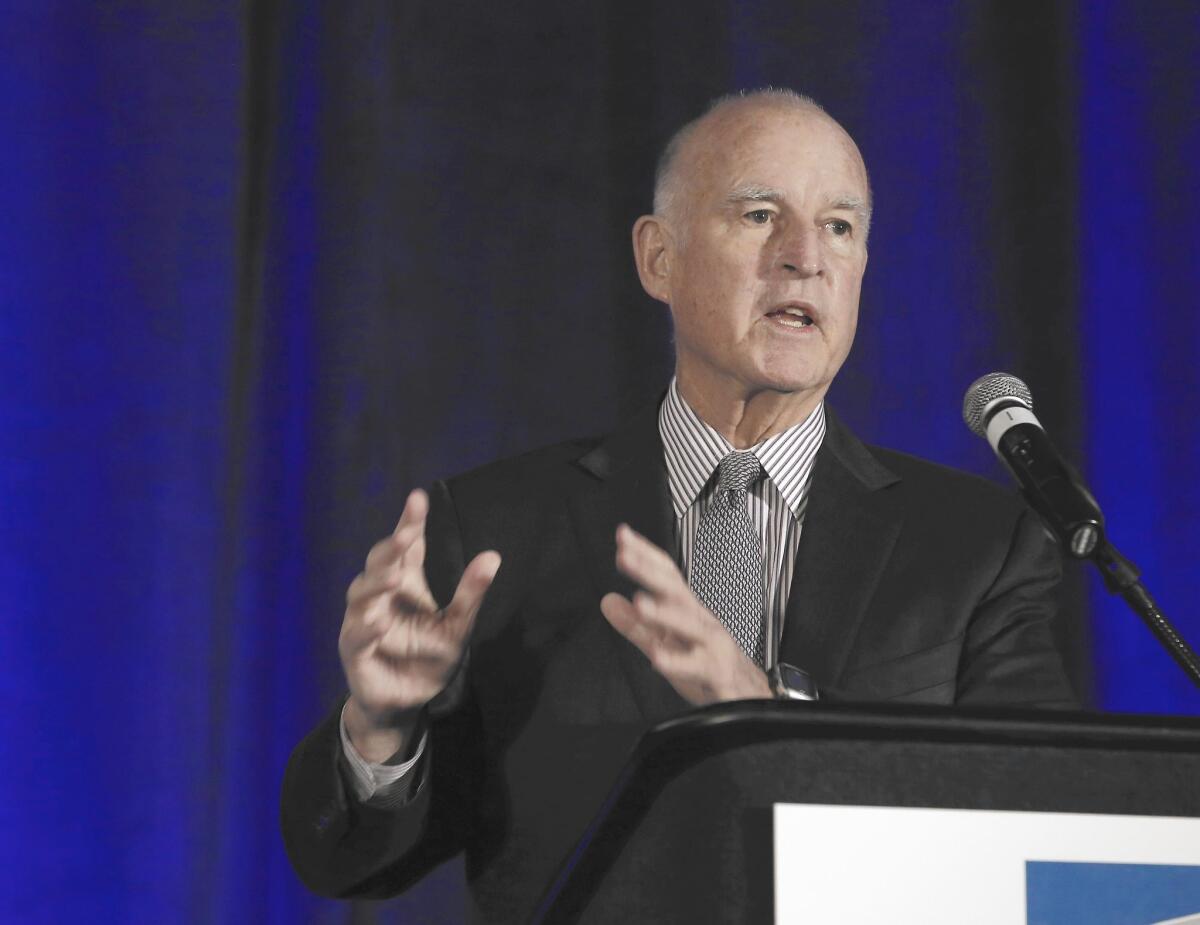
A taxpayer group has filed a lawsuit against Gov. Jerry Brown that seeks to invalidate a new law that will allow public funds to be used for political campaigning.
The lawsuit was filed in Sacramento Superior Court by the Howard Jarvis Taxpayers Assn. The legal challenge says that a law signed by Brown in September that allows cities and counties to use public financing for political campaigns violates Proposition 73, which voters approved in 1988 and prohibits public funds from being used in campaigns.
“It runs directly contrary to the expressed language of the Political Reform Act,” Jon Coupal, president of the association, said on Tuesday. He said the law cannot be changed without another vote of the people.
Using public funds to benefit candidates is unfair, Coupal said, because “it’s the power of government skewing the political process.”
The lawsuit, which was co-filed by retired state senator and judge Quentin L. Kopp names Brown and the state Fair Political Practices Commission.
Representatives of Brown and the commission declined comment. The measure was authored by state Sen. Ben Allen (D-Santa Monica).
Allen said at the time the law was signed that it could help reduce the influence of special interests that contribute to candidates’ campaigns.
“Anything we can do to empower communities to reduce the influence of money in campaigns is a good thing,” Allen said.
On Tuesday, Allen said he is confident the bill will survive the legal attack.
“Without SB 1107, we are powerless to offer candidates an alternative to the current reliance on special interest dollars,” Allen said in a statement.
12:08 p.m.: This post was updated with a comment from state Sen. Ben Allen (D-Santa Monica).
This post was originally published at 11:20 a.m.
- Share via
California representatives want more information on government animal testing
Federal agencies don’t do enough to track and justify their use of live animals for research, several members of Congress wrote in a letter asking the U.S. Government Accountability Office to examine the issue.
Rep. Ken Calvert (R-Corona) and Rep. Dina Titus (D-Nev.) led the letter, which also was backed by Reps. Lucille Roybal-Allard (D-Downey), Ed Royce (R-Fullerton) and Mimi Walters (R-Irvine) and eight other House members.
“We have discovered it is impossible to determine what federal animal research programs currently entail, what they cost and if they meet federal standards because of the limited and decentralized information available publicly. Federal agencies are not currently required to publicly report their total use of animals in research, do not publish noncompliance reports and generally do not maintain searchable databases of animal research projects with information about their purpose, methods, results, and cost,” the letter says.
Calvert said without the reporting, it is difficult for Congress to tell whether the research is effective and where there may be redundancies.
“I’m not opposed to the rare testing of animals when it’s absolutely necessary,” Calvert said. But, “most people in America who are asked would say, ‘No, let’s not harm animals unnecessarily if there are other methods.’ ”
The representatives also are asking the government oversight agency to look at which federal agencies conduct animal research and testing and how each agency informs Congress and the public about the costs, type of research and outcomes of the testing. They also want the office to look at how agencies report problems with testing and report their efforts to develop alternatives to animal testing.
In addition, representatives are asking for data on how much money each agency spent on animal testing and how many animals were used in testing in fiscal year 2016.
“One, I like animals, but two, I don’t like waste,” Calvert said. “In the end, this is going to save a lot of money, and obviously it’s going to increase the welfare for many [animals].”
California’s members of Congress made a similar appeal earlier this year for information on the military’s use of animals for medical training instead of simulated human flesh.
- Share via
How years of congressional wrangling led to a California water compromise

It took years of negotiations, and the right political timing, to bring the first major water policy affecting California in decades through the House and Senate.
Over frayed feelings and filibuster threats last week, both chambers overwhelmingly passed the bill, which changes how much water is pumped from the Sacramento-San Joaquin Delta to San Joaquin Valley farmers and Southern California.
So how did it come together?
- Share via
Former Huizar aide Sara Hernandez announces she’s running for Rep. Xavier Becerra’s seat
- Share via
Kamala Harris says California will ‘provide national leadership’ on immigration under a Trump administration
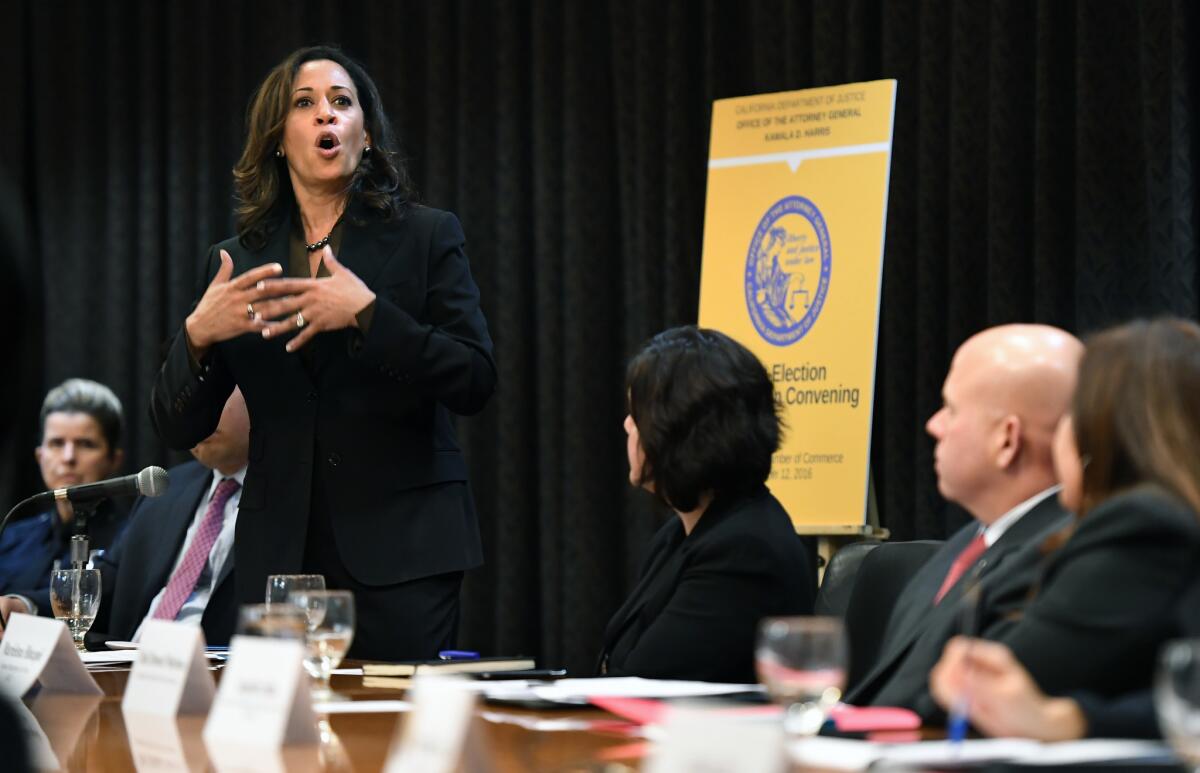
California Atty. Gen. Kamala Harris vowed Monday to be a loud, supportive voice for immigrants after she becomes a U.S. senator next month, pledging to push for comprehensive immigration reform and to work closely with lawmakers in Sacramento to “provide national leadership” on the topic.
Speaking to immigrant rights advocates, law enforcement officials, religious groups and business leaders at the Los Angeles Chamber of Commerce, Harris acknowledged that there is much anxiety over what President-elect Donald Trump — who said during the campaign that he wanted to build a wall along the Mexican border, deport millions of people and ban Muslim immigrants from entering the U.S. — will actually do when he takes office.
“We’re all feeling at least concerned,” Harris said. “We’re all feeling, I think, actually, a myriad of emotions.”
Harris said there are “two definitions of what it means to be a patriot.”
“There’s one definition that’s just, you defend your country, whatever it does,” she said. “And then there’s the kind of patriot I believe us all to be: the kind that will fight each and every day for the ideals of our country.… This is not subversive, this is not about anything other than love of country and, in loving our country, fighting for its ideals.”
Reporters were allowed into only the final few minutes of Harris’ hourlong discussion with local leaders. Those in the attendance included Gov. Jerry Brown’s choice for state attorney general, Rep. Xavier Becerra (D-Los Angeles); California Assemblyman Miguel Santiago (D-Los Angeles); and LAPD Chief Charlie Beck.
Speaking with reporters afterward, Harris said that people had shared stories about the crying children of immigrants and Muslims asking their parents if they were going to be sent away, and that law enforcement officials told her they worried victims of crimes would not report incidents out of fear that the police would turn them over to be deported. Harris also said people were concerned that parents who are in the U.S. illegally were keeping their children out of school and away from pediatricians because they worried about deportation.
“I feel very strongly that California’s voice must be a voice of leadership in Washington, D.C., on all the issues that we discussed,” she said. “We have an outsized stake in the outcome of the conversation about immigrants … and I feel very strongly that we must defend all people.”
Harris said she was against any policy that would deny children access to public health services, public safety and public education. She also said that the government has limited monetary resources and that although border safety is important, funding is also needed to address other areas including human trafficking and gun trafficking.
- Share via
Former Modesto legislator Kristin Olsen nabs California GOP leadership post
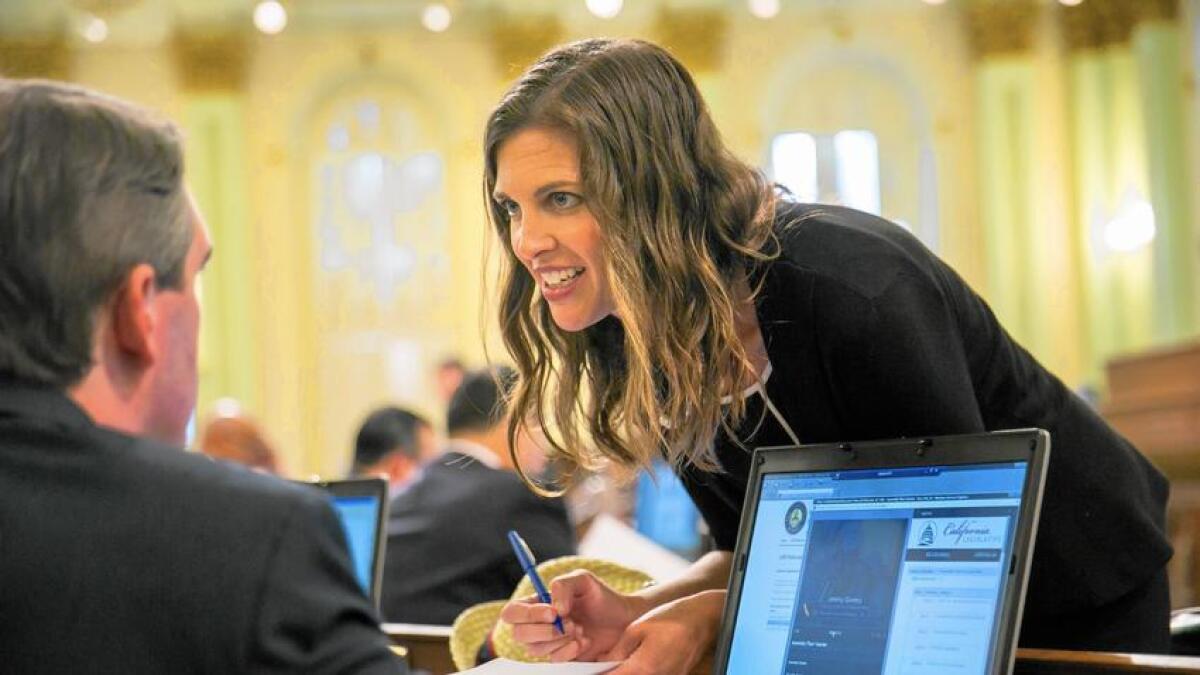
The California Republican Party has picked Kristin Olsen, a former assemblywoman from Modesto, to be its vice chair.
It’s the second new gig this year for Olsen, who was termed out of her Assembly seat this year and was recently elected to the Stanislaus County Board of Supervisors. Olsen’s six years in the Assembly included a 13-month stint as leader of the chamber’s Republican caucus.
“My goal is to help build a viable and vibrant Republican party in CA, because improving the lives of all Californians depends on having a healthy, two-party system in our state,” Olsen said in a statement.
“One-party Democrat rule is hurting people’s livelihoods and opportunities, and Californians deserve better than that,” she added.
Acknowledging the GOP’s weak presence in California — particularly in Sacramento, where Democrats secured a supermajority in the Legislature — Olsen said her party must study the “problems with the Republican brand” in the state.
In a statement, California GOP Chairman Jim Brulte said Olsen would play a key role in helping “continue to build the party from the ground up so we can better support Republicans.”
Olsen takes over the vice chair role from San Francisco attorney Harmeet K. Dhillon, who now serves as California’s national committeewoman for the national Republican Party.
- Share via
Olympic champion Simone Biles to help California Democratic Party chairman raise money for foster youth
- Share via
L.A. assemblyman snags high-profile backing from mayor, state Senate leader for Xavier Bacerra’s congressional seat
- Share via
L.A. City Councilman David Ryu is not running for Rep. Xavier Becerra’s congressional seat
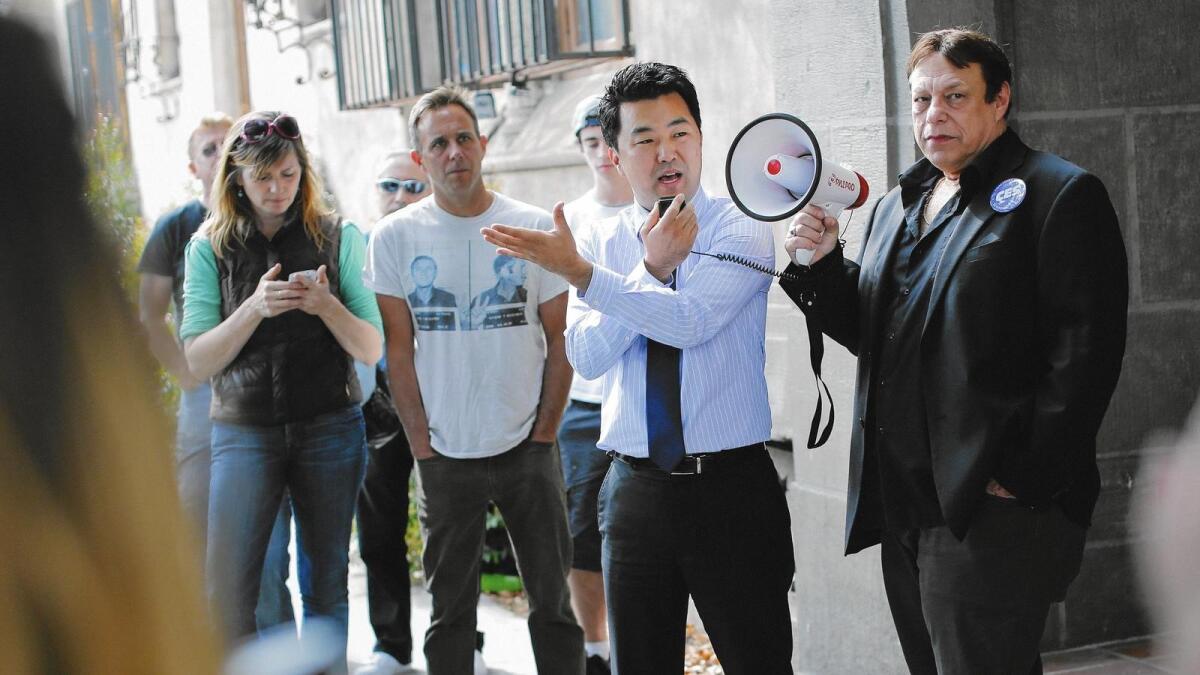
After mulling over a run for the 34th Congressional District over the last week, Los Angeles City Councilman David Ryu says he’s decided not to run.
Ryu said the election of Donald Trump prompted him to “consider how I might best serve.”
“After careful thought, it’s even more clear to me that my heart remains here in Los Angeles, in the neighborhoods and schools where I grew up,” Ryu said in a statement. “We all must defend the values that makes Los Angeles a beacon of hope for so many and fight for a future that lifts up every single Angeleno. For me personally, that means serving the people of the 4th Council District.”
Ryu’s announcement comes two days after former Assembly Speaker John A. Perez announced he was withdrawing from the race because of health issues, scrambling what was already becoming a crowded field.
The 40-year-old councilman is in his first term on the Los Angeles City Council and said last week he was considering a run after Gov. Jerry Brown picked Rep. Xavier Becerra (D-Los Angeles), who currently holds the seat, as state attorney general.
Three other candidates have said they are running for Becerra’s seat so far: state Assemblyman Jimmy Gomez (D-Los Angeles); local activist Wendy Carrillo, a Democrat; and Green Party candidate Kenneth Mejia.
FOR THE RECORD, 9:51 a.m.: An earlier version of this post stated that Ryu was the only Asian American potential candidate. Green Party candidate Kenneth Mejia is Filipino American.
- Share via
Former Assembly Speaker John A. Pérez decides against running for Rep. Xavier Becerra’s congressional seat
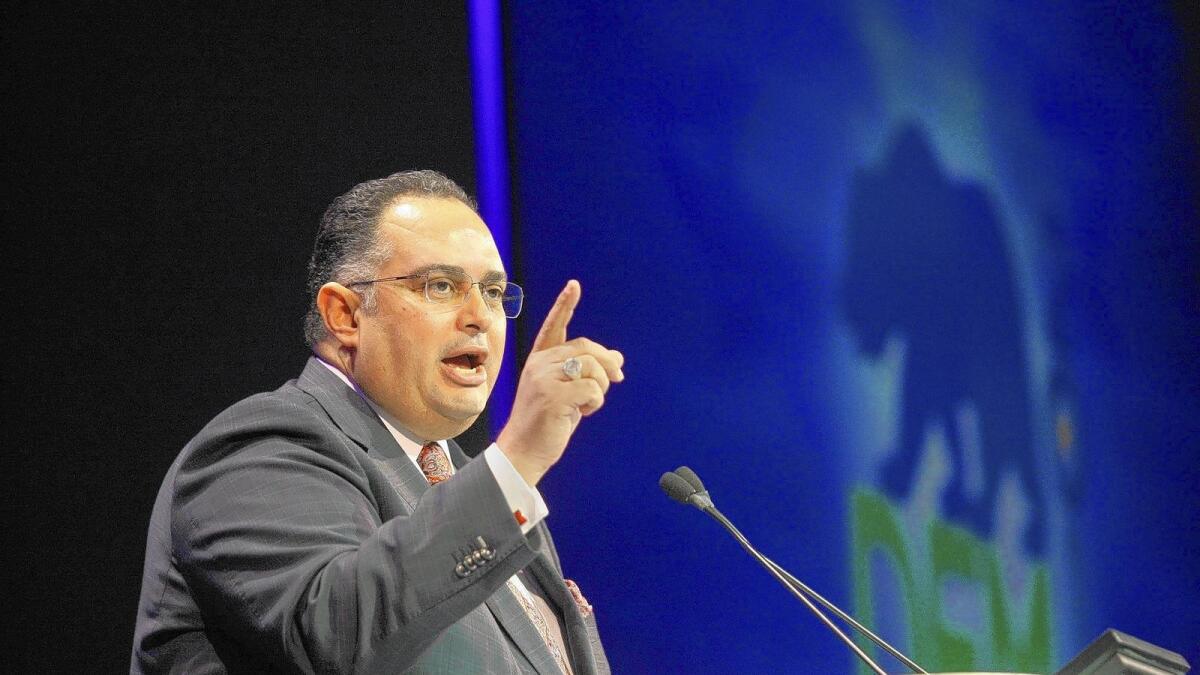
Citing a recent diagnosis of a serious health problem, former California Assembly Speaker John A. Pérez said Saturday he is dropping out of the race to replace U.S. Rep. Xavier Becerra (D-Los Angeles).
“I’ve got to focus on my health right now,” Pérez said in an interview. “But it was a very hard decision.”
The 47-year-old Democrat declined to offer specifics about his condition, citing a desire to keep it private. But he said it was serious enough that it would keep him from waging a vigorous political campaign in 2017.
“The treatment is one that doesn’t lend itself to the intensity of a campaign that the community deserves,” he said.
Pérez, who serves as a University of California regent, was the most high-profile politician who had entered the race. He was also the first to announce his candidacy after Becerra was chosen by Gov. Jerry Brown on Dec. 1 to be California’s next attorney general.
The timing of a special election to fill Becerra’s seat remains unclear, though it would probably take place next spring. The race is likely to attract a number of Los Angeles Democrats, with Assemblyman Jimmy Gomez (D-Echo Park) and activist Wendy Carrillo among those in the mix.
Pérez said it was too soon for him to decide whether to endorse any other candidate in the race to replace Becerra.
“Right now, I want to take a couple of days off,” he said. “I’ve got to get healthy.”
--------------------
FOR THE RECORD
Dec. 10, 2:18 p.m.: An earlier version of this post failed to mention activist Wendy Carrillo as a declared candidate to succeed Rep. Xavier Becerra.
- Share via
California Politics Podcast: Legislative Democrats say ‘fight’ Trump’s agenda
Few could dispute that the speech given this week by Assembly Speaker Anthony Rendon (D-Paramount) was anything but a political and policy call to arms.
“Californians do not need healing,” Rendon told his chamber during Monday’s swearing-in ceremony. “We need to fight.”
On this week’s California Politics Podcast, we take a look at both the substance and style of the fight that the state’s leading Democrats are ready to wage when it comes to the promises of President-elect Donald Trump.
We also discuss the final result of votes from the Nov. 8 statewide elections, after the last ballots were tallied by elections officials earlier this week.
I’m joined by Anthony York of the Grizzly Bear Project and Marisa Lagos of KQED News.
- Share via
California’s venerable Field Poll closes its doors after seven decades of surveying voters
The Field Poll, which began placing a finger on the pulse of California’s political debates in 1947, officially shut down operations Friday after its overseas owners decided to cut costs.
“It’s definitely the end of an era,” said Mark DiCamillo, the pollster who has led the organization’s survey efforts since 1992.
The company’s founder and the poll’s namesake, Mervin Field, died in 2015 after a long career sampling the opinions and preferences of Californians. Originally called the California Poll, the political surveying operation was designed less as a money-making effort than a way to boost the reputation of the company’s research expertise.
Field sold the company to a European advertising agency some two decades ago. DiCamillo said the current owners, Havas Worldwide, made the final decision a few weeks ago to close the tiny San Francisco polling operation.
Along with polls conducted by The Times and later by the nonpartisan Public Policy Institute of California, the Field Research Corp. sampled viewpoints on ballot measures and statewide candidates alike. Few polls could offer as long of a reach back into California’s boom times of the 20th century as could Field, with online archives dating back to 1956.
DiCamillo said Friday that about a dozen staffers would lose jobs early in the new year and that he was unsure what he would do next.
“The corporate world can be hard and cold,” he said. “I feel very fortunate to have had this role all these years.”
- Share via
California police officers will soon begin gathering data on the race of those they stop
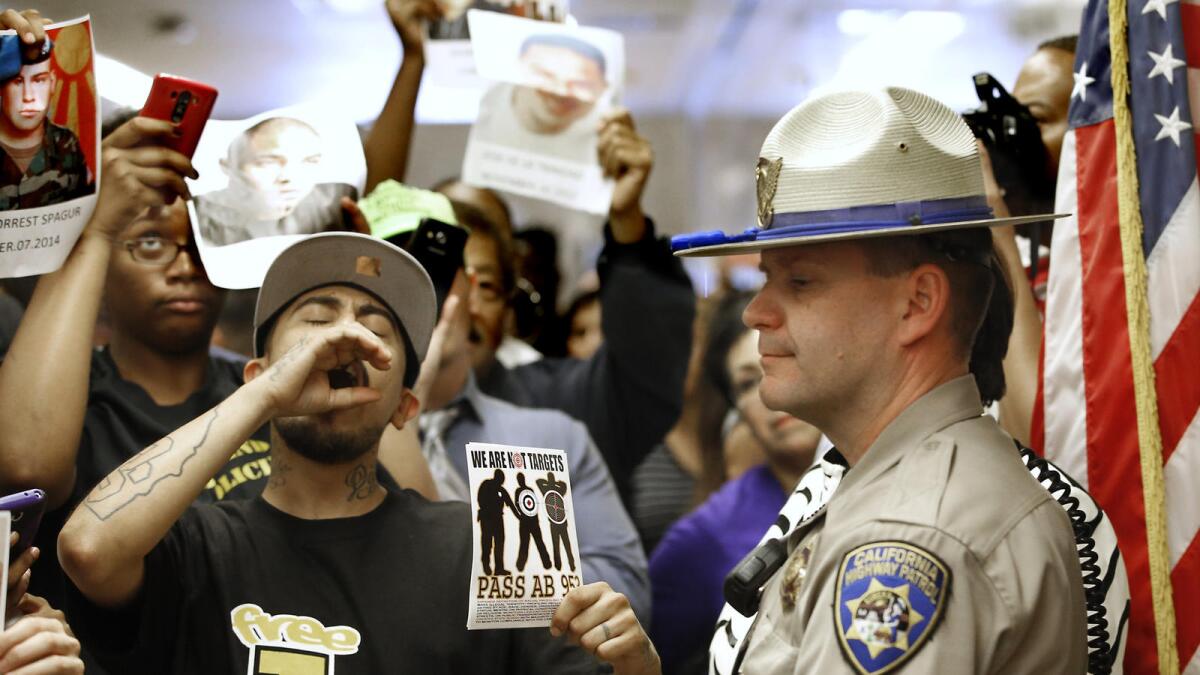
Police officers in California will soon track the race of those they pull over for traffic stops or encounter in the street, according to proposed guidelines released Friday by Atty. Gen. Kamala Harris.
The new rules, established by the passage of Assembly Bill 953 in 2015, are designed to help understand biases in policing efforts across the state.
“Racial and identity profiling weaken public trust and have debilitating effects on communities,” Harris said in a statement. “These regulations and data will help law enforcement improve policing practices and strengthen accountability.”
Aside from demographic information on race, gender and age of the person stopped, officers will have to record and collect the location, duration and reason for each stop under the proposed regulations. Officers also will be required to document the actions they take and the result of the encounter. The attorney general’s office will make the data public by each law enforcement agency through its criminal justice data website, OpenJustice.
Harris’ office is accepting comments on the proposed regulations through Jan. 27.
The state’s largest police departments, those with 1,000 or more peace officers, will begin collecting the data in 2018 and smaller departments have until 2022 to implement the program.
- Share via
Water fight: Sen. Barbara Boxer giving up on filibuster attempt
Sen. Barbara Boxer is ending her plans to filibuster a water infrastructure bill on the Senate floor.
“I’ve done it, so I’m happy,” Boxer told The Times after voicing her objections to the newly added California provisions of the bill for about 90 minutes Friday. “I’ve made my point and I’ve spoken enough.”
A group of California House members joined with Sen. Dianne Feinstein (D-Calif.) on Monday to add language that would authorize the pumping of more water from the Sacramento-San Joaquin River Delta to a water infrastructure bill co-written by Boxer.
Saying the new language opens the door to changing the Endangered Species Act, Boxer has spent the last few days trying to persuade colleagues to kill the entire bill, which authorizes hundreds of water projects across the country, including more than two dozen in California alone. The retiring senator had vowed to do everything in her power to stop the bill, but after the House voted, 360-61, Thursday evening to pass it, she says she is now being realistic.
“My hope is to reason with people and tell them why to kill it, but given the House vote it looks like the underlying bill is so good. … it’s a very uphill battle,” Boxer said. “I’m a realist, I’ve been here a long time.”
The Senate is expected to call the bill up for a vote at some point Friday, at which time Boxer or another senator could still object and have up to 30 hours to hold the floor. The House already has recessed for the year, and senators are raring to go home as well.
- Share via
Water fight: Sen. Barbara Boxer takes to the Senate floor
Sen. Barbara Boxer (D-Calif.) is talking on the Senate floor now about her water infrastructure bill and her objections to the California water policy that was added early in the week by Sen. Dianne Feinstein (D-Calif.), Rep. Kevin McCarthy (R-Bakersfield) and a group of California members.
Boxer has signaled that before the Senate leaves, she plans to filibuster the bill, which she says changes the Endangered Species Act. It passed the House, 360-61.
This may just be the opening salvo of what Boxer has planned. Most of the Senate is focused on resolving a separate fight to avoid a government shutdown by this evening.
We’re tracking it live. Follow along on Twitter.
- Share via
All signs point to former L.A. City Council aide jumping into race to replace Rep. Xavier Becerra
The field is already getting crowded in the race to replace Rep. Xavier Becerra (D-Los Angeles) in Congress as he awaits confirmation as California’s next attorney general — and the special election has yet to be called.
The next likely candidate to jump into the fray is Sara Hernandez, a former aide to L.A. Councilman Jose Huizar.
Huizar announced earlier this week that he would not run for the seat.
Hernandez, who now runs public affairs training institute Coro Southern California, has yet to announce publicly that she is running.
But she filed papers with the Federal Election Commission on Thursday for a campaign committee, and a website, sarahernandezforcongress.com, has been registered for her by a political consulting firm.
Fundraising pages for Hernandez on ActBlue and CrowdPAC are also active. The CrowdPAC fundraising page showed earlier this week that Hernandez had raised more than $20,000 in pledges.
- Share via
California’s ballots have all been counted — more than 14.6 million and most of them for Hillary Clinton
California elections officials completed their work tallying votes from the Nov. 8 election on Wednesday, submitting a final report of more than 14.6 million ballots cast in races from president to seats in Congress and the state Legislature.
Hillary Clinton, whose presidential bid came up short in the electoral college, handily beat President-elect Donald Trump in California by more than 4.2 million votes — almost double the number of ballots cast for Trump, helping boost her lead in the national popular vote.
Secretary of State Alex Padilla must certify the presidential vote by the end of this week and fully certify the election results next week.
Voter turnout in California, in the final unofficial returns, was higher than it was in the presidential election four years ago: 75.3% of registered voters cast a ballot last month, compared with 72.36% casting a ballot in 2012.
The closest statewide race was for Proposition 53, the effort to require future statewide elections for revenue bonds of $2 billion or larger.
Fought by Gov. Jerry Brown and business groups, Proposition 53 lost in unofficial results by just 151,646 votes out of more than 13 million cast on the measure.
With a majority of voters casting ballots by mail or dropping absentee ballots off on election day, election results now frequently take weeks to complete. A handful of the state’s 58 counties reported their votes Wednesday afternoon, almost one month after voters went to the polls.
- Share via
Gov. Jerry Brown’s top aide takes aim at Trump’s pick for the EPA
- Share via
Led by Californians, Democrats push back against the White House as they seek presidential pardons for ‘Dreamers’
Led by members of California’s delegation, dozens of House Democrats are again pleading with President Obama to pardon hundreds of thousands of immigrants brought to the U.S. illegally as children to whom he granted temporary deportation deferrals.
Last month, several members of Congress asked Obama to use his pardon authority to forgive the past and future civil immigration offenses of the nearly 750,000 people granted deportation deferrals under the Deferred Action for Childhood Arrivals, or DACA, program.
The lawmakers say that even though the so-called Dreamers would be left in legal limbo without work permits or visas, they could more easily apply for legal status from within the U.S. without immigration offenses on their records.
A White House official immediately batted down the idea, saying a pardon wouldn’t give them legal status.
In a news conference Wednesday, the lawmakers disputed that position, emotion filling their voices.
“Our request is very narrow in scope, we are simply asking him to protect these young DACA individuals who have committed no crime and who no fault of their own were brought to the United States with their families in search of a better life,” Rep. Lucille Roybal-Allard (D-Downey) said. “Their immigration status under DACA must be protected, and a presidential pardon would do just that.”
- Share via
California considers prohibiting immigration enforcement at public schools and hospitals
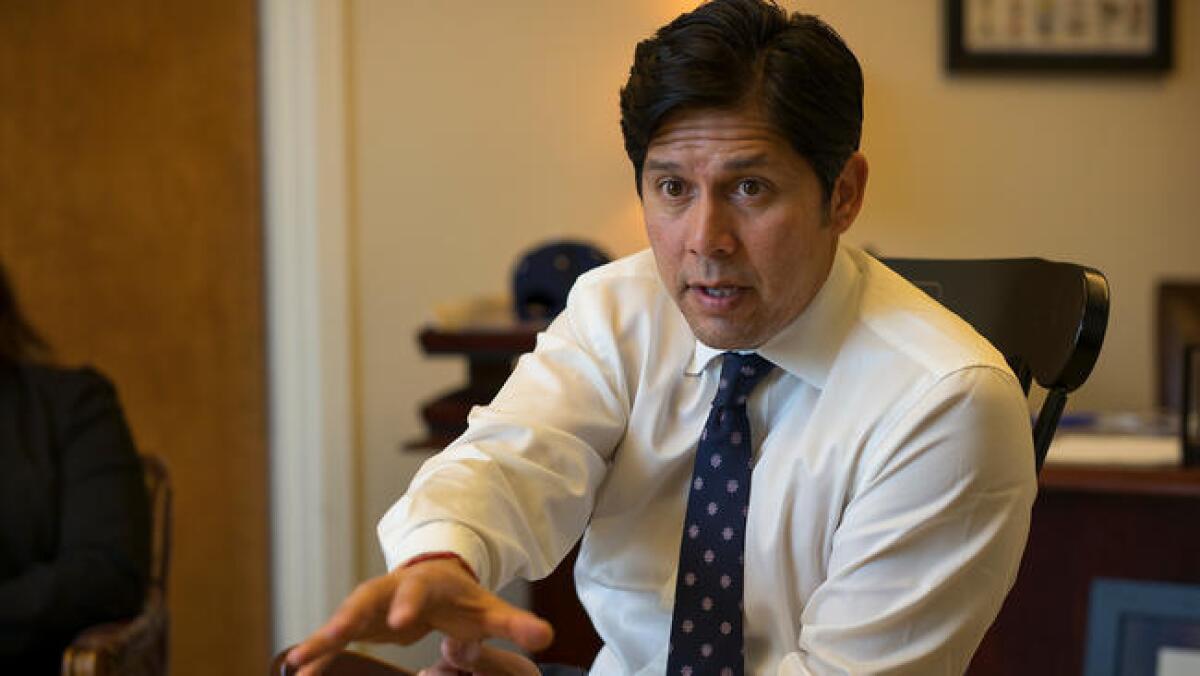
California would create “safe zones” prohibiting immigration enforcement on public schools, hospital and courthouse grounds under a new bill by state Senate leader Kevin de León (D-Los Angeles) that is sure to clash with the tough enforcement plans of President-elect Donald Trump.
By also proposing to bar state and local law enforcement from enforcing immigration laws, De León is doubling down on the issue at a time when Trump has threatened to withhold federal funding from “sanctuary cities” that refuse to help federal Immigration and Customs Enforcement agents.
“To the millions of undocumented residents pursuing and contributing to the California Dream, the state of California will be your wall of justice should the incoming administration adopt an inhumane and over-reaching mass-deportation policy,” De León said in a statement Wednesday.
In seeking to establishing “safe zones” for immigrants in the country illegally, SB 54 would require California schools, hospitals and courthouses to adopt policies that limit immigration enforcement on their premises to the fullest extent possible consistent with federal and state law.
Robin Hviston, who heads a group seeking tougher enforcement of immigration laws, said ICE agents are not going into schools and hospitals, and that Trump is focusing on deporting criminal immigrants, not students and patients.
“This is hysteria, whipping the community up with needless fear,” said Hviston, executive director of the Claremont-based group, We the People Rising.
In addition, Hviston said the state cannot stop federal agents from enforcing immigration law on specific properties.
“Federal law trumps state law,” she said.
Senate Republican leader Jean Fuller (R-Bakersfield) said the legislation would be reviewed to make sure there are no “unintended consequences” that could jeopardize public safety.
“Passions are still high after the last election, and I hope we can all agree to take a deep breath and avoid a rush to introduce legislation like this,” she said in a statement. “We need to support our law enforcement and make sure that the legislature is not passing bills that would limit their ability to keep all Californians safe.”
The provision barring the use of local law enforcement for immigration enforcement would not prevent agencies from complying with a judicial warrant to transfer violent offenders into federal custody for immigration enforcement purposes, De León said.
“We will not stand by and let the federal government use our state and local agencies to separate mothers from their children,” De León added.
Updated at 1:10 pm to include comments from Robin Hviston.
Updated at 5:30 pm to include comments by Sen. Jean Fuller.
- Share via
Santa Barbara Rep. Lois Capps says goodbye in final House speech
Rep. Lois Capps (D-Santa Barbara) looked back on her 10 terms representing California’s Central Coast in a final House speech Wednesday.
“Thank you, thank you truly to the people of the Central Coast for trusting me as your representative, for inspiring me every single day with your passion and your dedication for our nation and for California’s 24th District,” she said.
Capps first won the seat in a 1998 special election after her husband, Rep. Walter Capps, died early in his first term. The former school nurse has long been known as an advocate for healthcare and pipeline safety.
She will be replaced by Salud Carbajal (D-Santa Barbara).
Watch the full speech:
- Share via
Watch: California’s Barbara Boxer gives farewell Senate speech
Sen. Barbara Boxer (D-Calif.) made her farewell speech on the Senate floor Wednesday morning, marking her 24 years in Washington.
She reflected on her accomplishments and heartbreaks, talking about her work on the environment and Hillary Clinton’s loss in the presidential contest, and thanked the many who have helped her along the way, including her California partner of more than two decades, Sen. Dianne Feinstein.
Feinstein wasn’t in the chamber for Boxer’s speech. Her staff said the busy final week before Congress leaves kept her from attending.
Boxer also paid tribute to Anita Hill, saying, “Without her I never would have been elected to the Senate.” (More on that story here.)
Behind Boxer in the chamber, more than a dozen California House members lined the wall, including Minority Leader Nancy Pelosi (D-San Francisco), who wiped away a tear when the retiring senator hugged her after the speech. Dozens of family and staff watched from the gallery.
Toward the end of her nearly half-hour speech, Boxer’s voice broke as she read a letter from Jazz legend Sonny Rollins, in which he thanked her for making a “beautiful life” for people through her work.
“Because of the people of California who sent me here time and time again, 10 years at the House, 24 to the Senate, I had the opportunity to never stop trying,” Boxer said. “I had the opportunity to speak out. No matter how many times I had to try, I did.”
Senators all morning will spend time recognizing Boxer, others retiring from the chamber and Vice President Joe Biden, who represented Delaware in the Senate from 1973 to 2009 and is president of the Senate.
- Share via
Lawmakers reintroduce legislation to spend billions on low-income housing subsidies
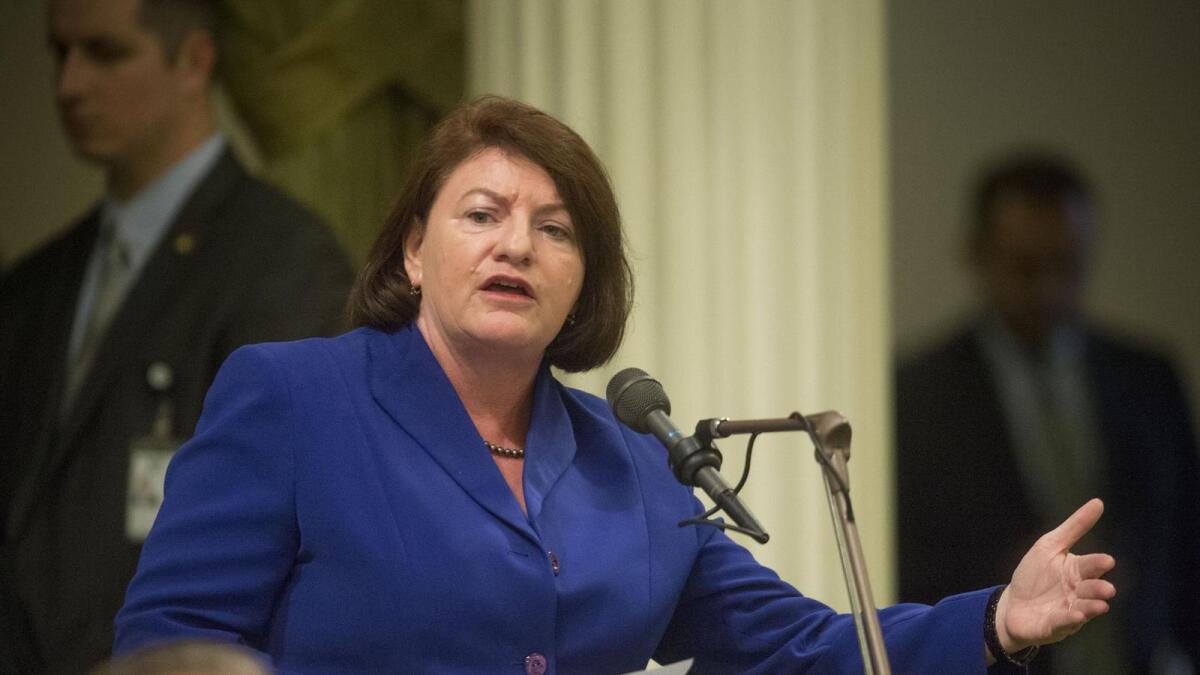
After failing to pass new funding to tackle the state’s housing affordability crisis last session, two state senators are trying again.
Sen. Toni Atkins (D-San Diego) and Sen. Jim Beall (D-San Jose) have re-introduced legislation to add a $75 fee to real estate transactions, which is expected to generate hundreds of millions a year for low-income housing construction, and place a $3-billion bond to finance low-income housing before voters in 2018, respectively.
Both bills were unveiled as part of Senate Democrats’ package of new spending plans to finance improvements in housing, transportation, water and parks infrastructure.
“Now is the time to rebuild the critical infrastructure that keeps our state moving and growing,” Senate President Pro Tem Kevin de León (D-Los Angeles) said in a statement. “Our families and businesses depend on affordable housing, safe and reliable roads and transportation options, and access to clean drinking water and healthy open spaces.”
Neither Atkins’ nor Beall’s bill passed last year. But Democrats now have a two-thirds supermajority in the Legislature, a margin that both bills require because they’re revenue measures.
California’s median home value of $479,600 is more than two and a half times the national average and rising.
Last year, the state’s major housing affordability efforts stalled. Lawmakers rejected a plan from Gov. Jerry Brown to streamline local approval for housing projects as a way to rein in costs. In turn, Brown held back $400 million in low-income housing subsidies he had agreed to spend had the Legislature acted on his proposal.
Major labor and environmental groups helped torpedo the governor’s effort, citing concerns about construction worker wages and sidestepping environmental laws. The same coalition told lawmakers this week they would support streamlining local approval for projects solely reserved for low-income residents among a host of other policies that aim to boost low-income housing development.
- Share via
Gov. Jerry Brown says Trump risks international backlash if he doesn’t address climate change
Gov. Jerry Brown predicted Tuesday that President-elect Donald Trump will experience a political backlash internationally if he pursues policies that deny the impact of climate change.
Appearing in a webcast for the Climate Reality Project, Brown was asked by former Vice President Al Gore whether states can have an impact on climate change if it is no longer a priority of the federal government.
Brown noted that, in addition to legislation in California, he has signed agreements with other states to pursue policies to address global warming. But he said there are indications Trump may delay action if he is not convinced it is a serious problem.
“If our new president takes that as his proposition, I believe that the reaction will be negative and very powerful throughout the world,” Brown said. “I don’t think, given the science and given the rising concern, that that is a sustainable political trajectory, even for the president of the United States.”
Gore said Brown has been “forward-leaning and bold” and has provided “national leadership” on climate change.
The former vice president met with Trump on Monday in New York City, but declined afterward to discuss details of their conversation.
Brown said more and more people are coming to the conclusion that climate change is a real problem.
“The science is clear and the peril is dire,” Brown said. “Based on that, people are willing to act.”
- Share via
As supermajority-boosted state Democrats challenge Trump, what’s a California Republican to do?
State Republicans in California have watched their base shrink, their seats in Congress dwindle and their national party fissure amid the election of Donald Trump and his new vision for the GOP.
But most in the newly elected freshman class of state Republican lawmakers say they are unfazed by what’s happening in Washington: They want to keep the focus on the issues critical to their local districts.
“The policy coming from D.C. will impact us,” said former Irvine Mayor Steven Choi, who won the 68th Assembly District seat representing Orange County. “But the California Legislature will have its own agenda. How much you can fight or work with them is a totally different game.”
Next year’s legislative session is already off to a rancorous start as state Democratic leaders and lawmakers on Monday set a combative tone against Trump, filing a slew of bills on immigration, and urging the president-elect to abandon threats of mass deportation.
But the list of priorities for newly elected Republicans remains largely unchanged from previous years. Lawmakers said they hope to remove burdensome regulations on small businesses, find common ground between employers and employees and address a shrinking water supply.
Some were cautiously optimistic that a Trump administration could further their causes. And although their views on the president-elect are mixed, they said his message struck a chord with the economic frustrations of middle-class families in their districts.
Republican Assemblyman Vince Fong, who supported Trump in the primary and general election, described the new administration as “a fresh start” to address the concerns of people in his district, though the values of his party remained the same in the state.
“We are the party who fights for hardworking families and small businesses,” said Fong, whose Assembly district encompasses most of Kern County. “We are the party of personal initiative and personal freedom, and I believe that is what the Republican party represents.”
To Republican Heath Flora, who claimed the District 12 State Assembly seat centered in Modesto, it is an “exciting time for young Republicans” to re-brand themselves as a party.
“Donald Trump is a lot of different things, and as a Republican we are going to work with the administration,” Flora said. “But we need to make sure that we fight for California first.”
- Share via
Charter bus riders who choose not to buckle up could be fined under new proposal
Two months after a bus accident in Desert Hot Springs killed 13 people, a state lawmaker is proposing to require passengers on charter buses equipped with seat belts to use them.
The USA Holiday charter that plowed into a big rig did not have seat belts for passengers, but a new rule that took effect last month requires the restraint devices on newly manufactured buses.
With that new rule in mind, state Sen. Jerry Hill (D-San Mateo) has introduced State Bill 20, which would require drivers of charter buses to tell passengers before each trip that they are required to wear seatbelts. Signs would also have to be posted on the requirement.
Passengers who do not buckle up would face a fine of $20 for the first offense and $50 for all subsequent offenses — consistent with the law for seatbelts in cars, Hill said.
He said Tuesday many people in cars would not wear seatbelts without potential fines, so the same concern applies to bus riders.
“Without a mandate to wear a seatbelt, the seatbelt is useless in protecting someone,” Hill said. “When you look at the number of lives that have been lost in California and the injuries, this could prevent a lot of deaths.”
The National Highway Safety Transportation Administration has reported that traffic accident fatalities can be reduced by as much as 44% when seat belts are used.
“We need to do what we can to make sure passengers stay in their seats and don’t fly through the window,” Hill said.
- Share via
Kenneth Mejia, a 26-year-old self-proclaimed ‘Berniecrat,’ joins the fray in 34th Congressional District
- Share via
Attacks on police officers would be classified as hate crimes under California bill
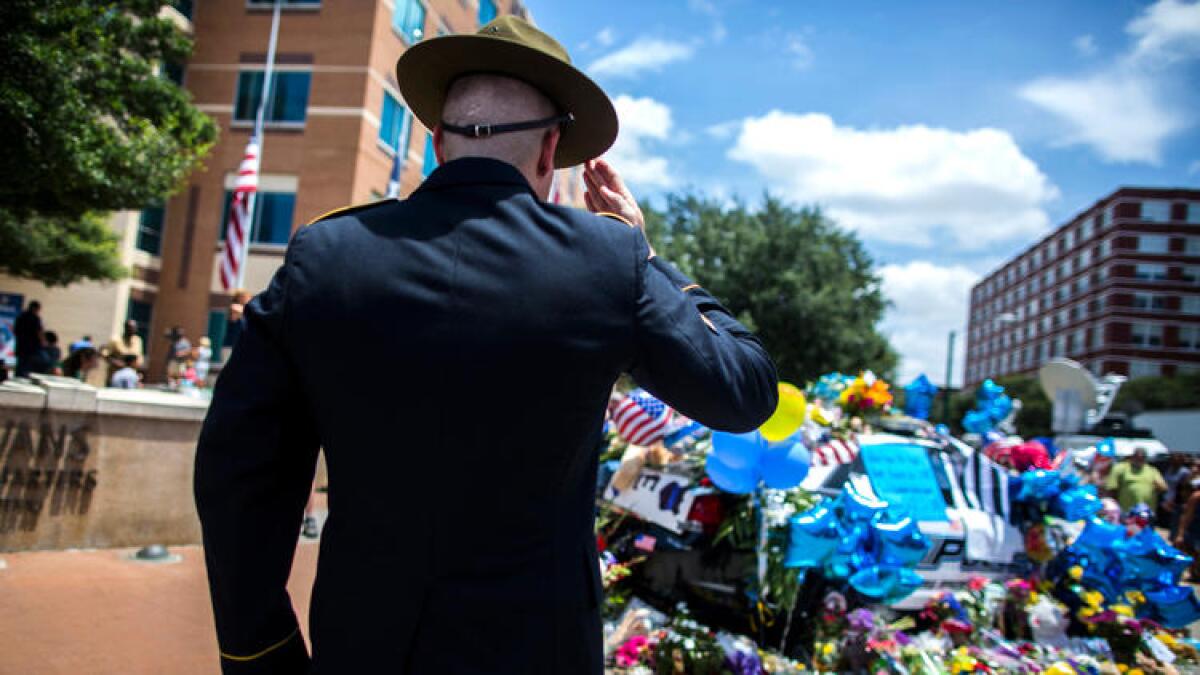
Alarmed by a wave of shootings targeting police officers, state Assemblyman Jay Obernolte (R-Big Bear) has introduced a bill that would make an attack on law enforcement a hate crime in California, allowing stiffer penalties for those convicted.
Obernolte’s bill comes after a series of shootings that have left 62 law enforcement officers dead so far this year, according to the National Law Enforcement Officers Memorial Fund. That is up from 38 officers shot to death in the line of duty by this time last year.
Just in July, five police officers were killed by a gunman in Dallas, and three more died in a rampage in Baton Rouge, La. The shootings occurred at a time of high tension between law enforcement and some communities over police killings of unarmed people of color.
“Our police officers put their lives on the line every day and it’s deeply disturbing when they are intentionally targeted because of their chosen profession,” Obernolte said Tuesday in a statement. “This law will send a message to criminals targeting law enforcement officers that their reprehensible behavior will not be tolerated.”
Offenses committed because of the victim’s race, religion, disability or sexual orientation may currently be prosecuted as hate crimes in California.
Conviction of a hate crime can result in an additional one to three years in state prison being tacked on to an offender’s sentence, depending on the circumstances.
Earlier this year, Louisiana adopted a measure, dubbed the Blue Lives Matter bill, making attacks on police officers a hate crime, and similar proposals are being considered in Texas, New Jersey and Mississippi, as well as in the U.S. Congress, which can change the federal hate crime law.
Some groups, including the American Civil Liberties Union, have voiced concerns that such laws could dilute the original intent of hate crime measures to protect vulnerable classes of citizens.
There are already sufficient strong penalties available for those who attack police officers, said Kevin Baker, legislative director with the ACLU of California’s Center for Advocacy and Policy.
“Our hate crime statute is simply not the proper home for these offenses,” Baker added. “Peace officer status is an employment category not analogous to the personal characteristics included in our hate crime statute, including disability, gender, nationality, race or ethnicity, religion, and sexual orientation.”
Updated at 1:20 pm to include comment from ACLU official.
- Share via
White House is leery of Sen. Dianne Feinstein’s California water plan
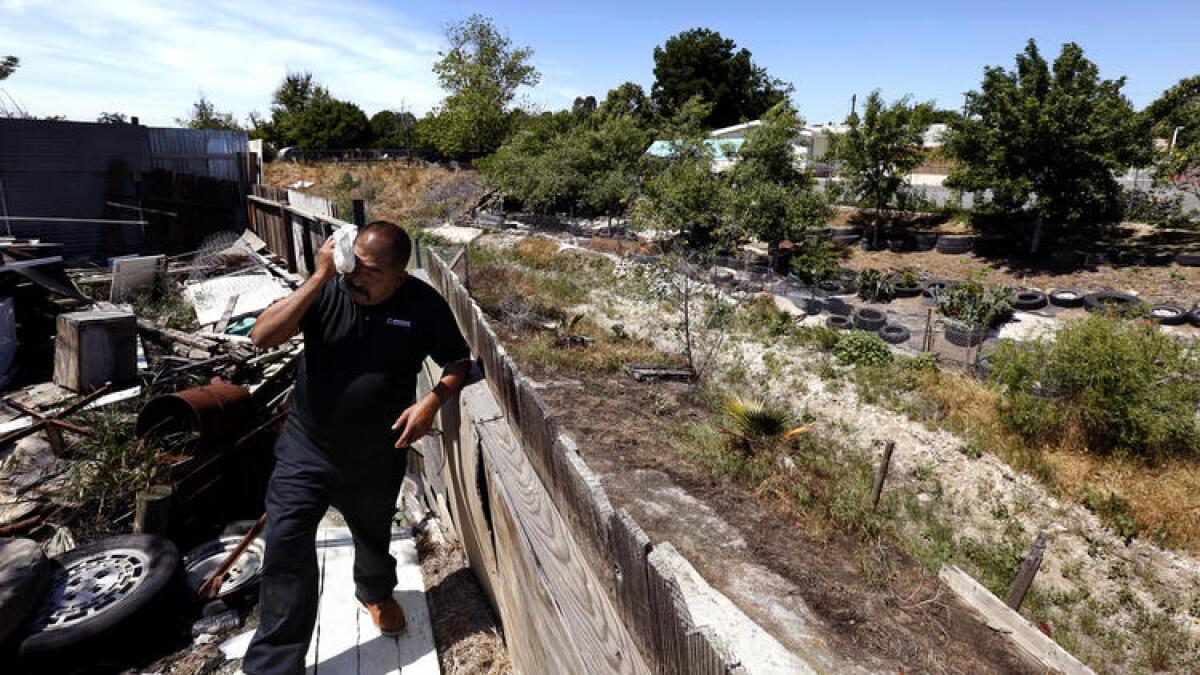
White House spokesman Josh Earnest said Tuesday that the Obama administration was still reviewing the California water policy included in the proposed Water Resources Development Act on Monday by California’s senior senator and Republican members of the state’s congressional delegation.
“Based on what we know so far, we don’t support the kinds of proposals that have been put forward to address some of the water resources issues in California right now,” Earnest told reporters Tuesday. “So we don’t support that measure that’s been put forward, but we’ll take a look at the bill in its totality. And there’s more of those — more proposals that are included in the bill that we need to review.”
California’s House Republicans and Sen. Dianne Feinstein (D-Calif.) agreed Monday to insert a 90-page proposal to increase water deliveries to San Joaquin Valley farmers and Southern California and build long-term water infrastructure into a bill written by Sen. Barbara Boxer (D-Calif.) that includes a host of water infrastructure projects across the U.S.
Boxer herself is vehemently opposed to the added proposal, which she says would open the door to changing the Endangered Species Act because it modifies the environmental restrictions that have at times limited water deliveries from the Sacramento-San Joaquin Delta to the San Joaquin Valley and Southern California.
The Water Resources Development Act is among a handful of bills the House and Senate hope to pass before they are scheduled to recess Friday, and Boxer has vowed to slow or halt all legislation in the Senate until the California proposal is removed.
Feinstein said making the change now would capture increased flow during the rainy season, and would preempt Republicans from making changes when Democrats may have less leverage to negotiate under President-elect Donald Trump. The included language largely mirrors legislation she proposed as a compromise to address agricultural water needs, drinking water needs in the south and protecting flow in the delta needed to maintain the salmon population.
Rep. David Valadao (R-Hanford), whose Central Valley district is one of the hardest hit by water shortages, praised the proposal as providing “interim relief, which my constituents desperately need.”
Earnest emphasized that Republicans shouldn’t use the disagreement within the California delegation as a reason to kill the bill, which includes funding for Lake Tahoe, the Salton Sea, the Los Angeles River and a long-negotiated deal for resources to address the ongoing lead contamination of the water supply in Flint, Mich.
“We’re nearing the end of the first week in December. And we know that plenty of Republicans are hoping to get out of town and begin their holiday celebrations at the end of this week,” he said. “They should not do so until they have fulfilled their promise to the people of Flint who are waiting for the United States Congress to actually do something to address the difficult situation that they’re facing there.”
- Share via
State lawmakers may tell California pension funds to divest from Dakota pipeline companies
California lawmakers will consider a proposal next year to block the state’s pension funds from investing in a controversial oil pipeline that is planned to cross North Dakota’s Standing Rock Sioux Reservation.
The proposal, Assembly Bill 20 by Assemblyman Ash Kalra (D-San Jose), would require California’s two public employee pension funds to divest any holdings in companies involved in the Dakota Access pipeline. The project, designed to carry some 30,000 barrels of oil a day from North Dakota oil fields to Illinois, has been the focus of large protests from Native American tribes, environmental and civil rights activists and veterans. On Sunday, the U.S. Army Corps of Engineers refused to approve a permit needed to complete the project.
Kalra said he traveled to the North Dakota reservation after winning the Nov. 8 election, to see the protests and the project up close.
“I think what’s happening there is really part of a greater movement,” he said in a phone interview. “And the greater movement is to move away from our continued investment into fossil fuels.”
The bill introduced at the state Capitol on the first day of the Legislature’s new session would give the two pension funds — the California Public Employees Retirement System and the California State Teachers Retirement System — until 2018 to make any changes needed to their multibillion-dollar investment portfolios.
A CalPERS spokesman confirmed Monday that the fund owns about 1.1 million shares of Energy Transfer Partners, the company involved in the pipeline project. Representatives of the teachers’ fund, CalSTRS, didn’t immediately reply to a request for comment.
Lawmakers have imposed rules on pension investments in the past, from bans involving companies that do business in Sudan and Iran to those producing thermal coal.
“As Californians, we must hold ourselves to a high standard line of conduct, including how we invest our pension funds,” says the language of Kalra’s bill.
Update 3:07 p.m. This story was updated with additional information on CalPERS’ stock holdings and comments from Assemblyman Kalra.
This story was originally published at 12:07 p.m.
- Share via
Legislators hope to shine a light on elected officials’ wealth and who pays for robo-calls with new transparency bills
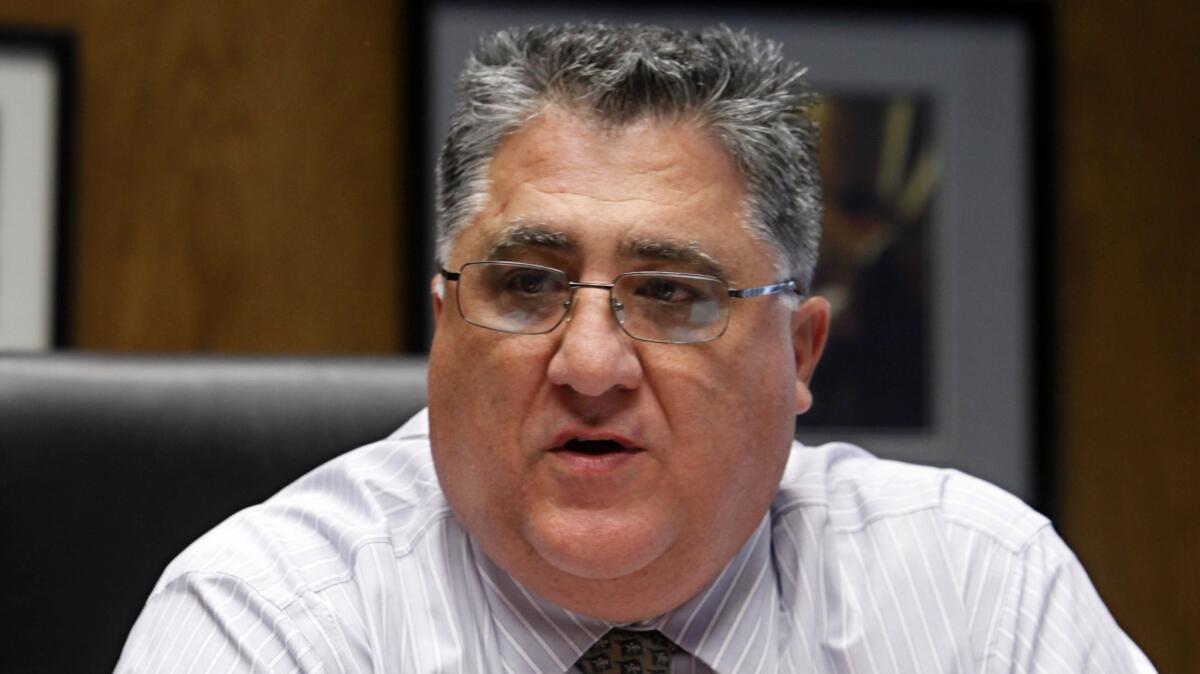
State elected officials would have to disclose more details about their wealth and investments to the public under a bill reintroduced this week by newly elected state Sen. Anthony Portantino (D-La Cañada Flintridge).
Currently, elected officials must check a box disclosing the value of their investments and income in broad ranges that include between $2,000 and $10,000, between $10,000 and $100,000, between $100,000 and $1 million and more than $1 million.
For example, the latter category’s box could be checked both by someone with an investment worth $1.1 million and by someone with an investment worth $15 million, so the public does not get a clear picture of the interest.
Portantino’s bill, SB 24, would expand the categories to eight to also include whether the value of the investment is worth between $1 million and $5 million, between $5 million and $10 million and more than $10 million.
A similar bill by Portantino when he was a member of the state Assembly was vetoed in 2012 by Gov. Jerry Brown.
“The law already requires public officials to disclose their income and investments with enough particularity so that conflicts of interest can be identified,” Brown wrote in his veto message. “I am not convinced that this bill will provide more useful information to the public.”
With numerous news reports about possible conflicts of interest involving President-elect Donald Trump and his appointees, Portantino, who was elected last month, said he hopes his new bill will be seen as more timely this year.
“Looking at Washington, it is clear that it can be hard to get elected leaders to recognize the importance of transparency,” Portantino said in a statement. “I hope that with all the recent focus on conflict of interest, now is the time for California to lead by example and embrace greater disclosure.”
The bill is one of a trio of measures introduced this week to regulate elected officials and candidates.
Another measure, AB 14 by Assemblyman Jimmy Gomez (D-Echo Park), would require candidates and political committees to disclose in campaign phone calls who is paying for the call.
A third bill, SB 45 by Sen. Tony Mendoza (D-Artesia), would ban mass mailing at taxpayer expense within 90 days of an election by or on behalf of a candidate whose name will appear on the ballot.
- Share via
California bill aims to help National Guard veterans forced to pay back enlistment bonuses
A state senator has introduced legislation meant to aid thousands of California National Guard veterans who were ordered to repay large enlistment bonuses used to entice them to go to war in Iraq and Afghanistan.
SB 14, filed by Sen. Ted Gaines (R-El Dorado), would create a grant program to repay service members who paid taxes on an enlistment bonus awarded on or after Jan. 1, 2004, and before Jan. 1, 2011.
The bill would require the Franchise Tax Board to create an application for people to apply to the program and would provide grants in the amount equal to the personal income taxes that veterans paid on their bonuses. The appropriations would come from the state’s general fund.
The legislation, which would require a two-thirds majority vote, would go into effect immediately as an urgency statute.
Gaines filed the proposal in response to Los Angeles Times reporting that nearly 10,000 soldiers were ordered to repay large enlistment bonuses — and slapped with interest charges, wage garnishments and tax liens if they refused — after audits revealed extensive overpayments by the California Guard at the peak of the wars last decade.
Many had served multiple combat tours, and although the U.S. Department of Defense suspended efforts to claw back enlistment bonuses, some veterans have already paid back some or all of their bonuses.
- Share via
Former Assembly speaker nabs endorsement from Lt. Gov. Gavin Newsom in race to replace Becerra
- Share via
EBay faces fines from state ethics watchdog after failing to disclose Sacramento lobbying on time

Online retailer EBay has agreed to pay $6,500 in fines to the state’s campaign finance watchdog agency for failing to properly disclose its lobbying of the state Capitol and political contributions it made to candidates, according to newly released documents.
The state Fair Political Practices Commission will consider the fines at its Dec.15 meeting.
Violations included filing two lobbying disclosure reports 299 and 207 days late, respectively, which investigators said delayed the public’s learning that the company had spent $42,000 to influence public officials.
About $27,000 in campaign contributions also were disclosed in the late filings. The disclosures show that EBay lobbied members of the state Legislature on 10 bills during the first half of 2015, including a measure requiring firms to improve security to protect customers’ geo-location information and tax identification numbers.
The reports do not require lobbying firms to disclose which legislators they lobbied.
EBay representatives told investigators the failure to file the electronic reports on time was “inadvertent” and caused by a transfer of responsibility for filing during a “corporate transition.”
The firm also was late in filing statements required of major donors that disclose their contributions.
The FPPC report said delayed filing violates a central tenet of the state disclosure laws: “that the activities of lobbyists should be regulated and their finances disclosed in order that improper influences will not be directed at public officials.”
In recommending fines under the $20,000 maximum, the investigators said EBay does not have a prior history of violations and cooperated with the investigation.
- Share via
Gov. Jerry Brown and helpers light the state Capitol Christmas tree
- Share via
Proposal to allow roadside testing for marijuana use is revived
A month after Californians legalized recreational marijuana use, Assemblyman Tom Lackey (R-Palmdale) introduced a bill Monday that would allow law enforcement to use roadside drug testing devices to check for driving under the influence.
A former sergeant with the California Highway Patrol, Lackey said his proposal takes on new urgency because of the passage of Proposition 64 on Nov. 8.
“The ballot initiative passed this year to legalize marijuana will result in more marijuana consumers on our state’s highways and roads,” Lackey said in a statement. “It is imperative that we invest in a broad spectrum of technologies and research to best identify marijuana-impaired drivers.”
The CHP is separately studying ways to identify drug-impaired drivers. A similar bill last year did not make it to the governor’s desk amid concerns that field testing devices are not dependable.
Lackey’s bill would allow tests using saliva samples taken from drivers suspected of being impaired. He said the test quickly informs officers whether the driver tested positive for several classifications of drugs including marijuana.
The measure is supported by Chief Ken Corney, president of the California Police Chiefs Assn.
“Our federal partners have demonstrated the efficacy of oral fluid testing, and we look forward to utilizing the technology at a state level,” Corney said in a statement.
- Share via
California lawmakers prepare to take a stand on immigration against the federal government
After heated debates in both chambers, California state lawmakers on Monday said they were prepared to stand up to an incoming federal administration that threatened the state’s progressive work to incorporate the immigrant community into society.
“We are here because the president-elect said immigration would be one of his first targets,” Assembly Speaker Anthony Rendon said. “There is still a lot of uncertainty about what the administration will actually do. But again, we have all heard the insults, and we have all heard the lies. We have also all heard the threats.”
Lawmakers said they wanted to remind Congress of immigrants’ contribution to the economy through a number of resolutions and bills filed on Day One of the legislative session. And they sought to send the message that the state does not approve of bigoted rhetoric, mass deportation or expedited removal from the country without due process.
A pair of resolutions stating elected officials’ support for a comprehensive and workable approach to fixing the nation’s historically broken immigration system passed both the state House and Senate. But they sparked testy exchanges among lawmakers over whether the state was acting too soon.
Two more bills aim to bolster the legal representation of immigrants who are in the country illegally and face the threat of deportation. Lawmakers said it was premature to talk cost estimates but gave a range of anywhere from $10 million to $80 million to implement both proposals.
The most sweeping proposal would use state government grants to fund attorneys for immigrants through a public defender model. Attorneys would be appointed by judges, lawmakers said.
Rendon said he was not concerned about hurting the state’s relationship with the federal government. “President-elect [Donald] Trump had made his stances clear,” he said.
Senate President Pro Tem Kevin De León said leaders were looking to work with federal officials and find common ground.
“We are not looking for a fight,” he said. But as “elected officials of the most diverse state, the greatest mosaic of hues on this planet, it is our moral responsibility, it is our political responsibility to protect the most vulnerable of this state.”
- Share via
Under proposed legislation, Californians could search a database for the names of those convicted of hate crimes
Californians could search a state government database for the names of those convicted of hate crimes under a proposed state law inspired by incidents reported since the Nov. 8 election, its author said.
The bill by Assemblyman Raul Bocanegra (D-Pacoima) would require the state Department of Justice to create a public database of felons convicted of hate crimes related to race, religion and sexual orientation.
Local law enforcement officials have reported a recent rise in reported hate crime incidents. Existing state law require local and state law enforcement officials to compile hate crime information, and reported a 10.4% statewide increase in those incidents last year.
But that data is for statistical purposes, while the proposed law would create a database designed for Californians to search. It would not, Bocanegra said in a written statement, include any information on the victims of those hate crimes.
- Share via
Wendy Carrillo, whose mother brought her to the country from El Salvador illegally, enters race for Becerra seat
A civic and labor activist and journalist who had been in the country illegally is joining the race for the 34th Congressional District.
Wendy Carrillo, 36, a Democrat from Boyle Heights, announced her plans to run in a post on Medium Monday.
Carrillo said in the post her parents brought her to the United States from El Salvador as a child. After learning she was not legally in the United States at age 13, Carrillo became a U.S. citizen before her 21st birthday. (Article 1 of the Constitution requires a person be a U.S. citizen for seven years to run for Congress.)
“I was fortunate while so many others haven’t been. I take that blessing very seriously,” she wrote. “Before my 21st birthday, I became a citizen and for a few years I was the only voting member in a family of seven.”
Raised in City Terrace, Carrillo attended El Sereno Middle School, Roosevelt High School in Boyle Heights, East Los Angeles College and received a bachelor’s degree at Cal State Los Angeles and a master’s degree at USC. She was the host of “Knowledge Is Power” on Power 106-FM.
Rep. Xavier Becerra (D-Los Angeles) is planning to vacate the seat after being officially nominated as the state’s next attorney general. Former Assembly Speaker John A. Perez announced his plans to run for the seat last week. Assemblyman Jimmy Gomez, a Democrat from Echo Park, joined the race Monday.
“Together, we can build a campaign about the possibilities of what can be and what should be,” Carrillo said in a statement. “I’m choosing to run because I want a seat at the table to advocate for the people who need it most. Public service is a privilege, not a game of musical chairs. I plan to put the people first.”
- Share via
Neither Gov. Jerry Brown nor his pick for California attorney general sound the alarm on a Trump administration
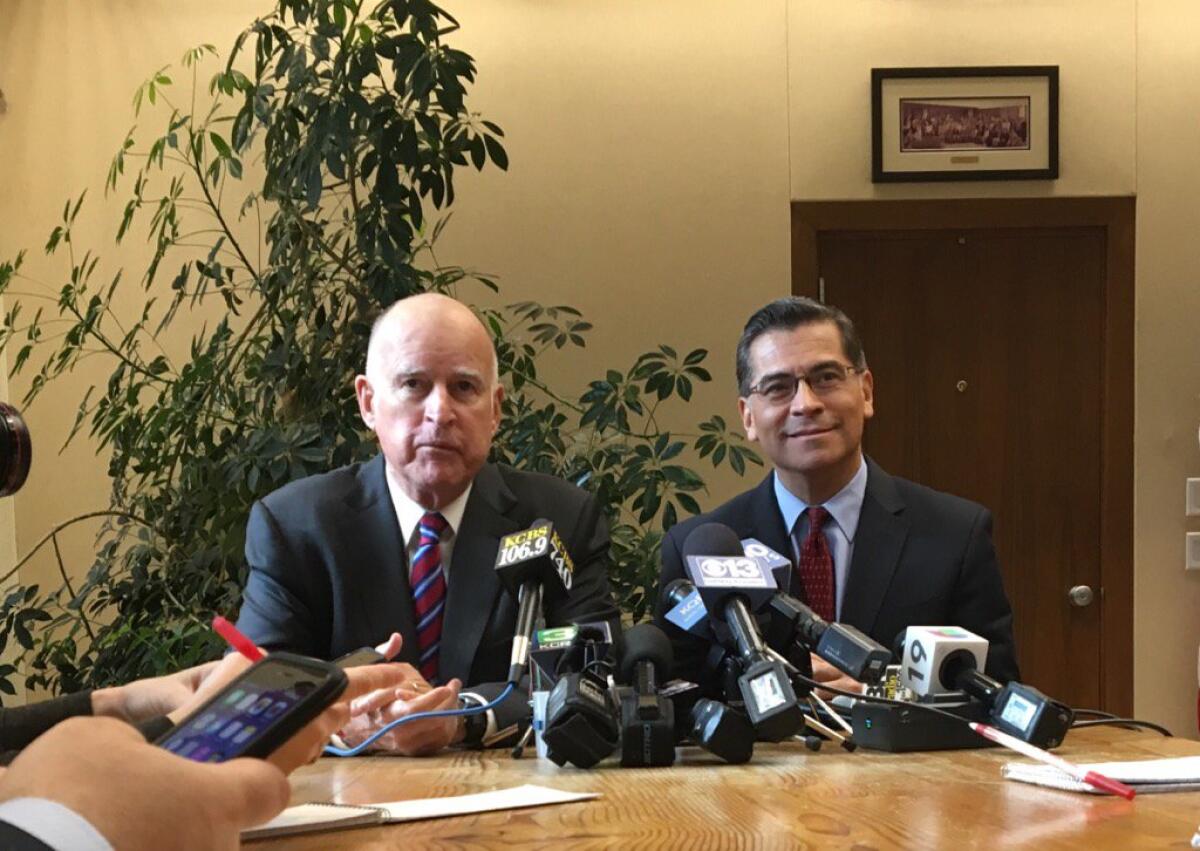
The two men who likely will lead any California efforts to fight the policy changes contemplated by President-elect Donald Trump appeared unwilling to throw the first punch Monday, vowing instead to watch the new administration carefully.
“We’ll just have to watch to see what moves the federal government makes,” said Gov. Jerry Brown in a meeting with reporters in his state Capitol office. “And I think that’s the wiser course of action.”
Sitting beside Brown was Rep. Xavier Becerra (D-Los Angeles), the governor’s choice to succeed Atty. Gen. Kamala Harris once she takes the oath of office as a U.S. senator next month.
Becerra also sounded a note of caution on issues such as immigration and healthcare.
“We won’t shy away from representing and defending what we stand for as Californians,” Becerra said. “But we’re not out there to pick fights.”
The tone of the governor, who didn’t avoid critiquing the president-elect during the campaign, was noticeably different from that struck by Democratic leaders of the Legislature during the opening hours of the new two-year legislative session. Hours after Brown and Becerra’s comments, both houses were riven by a heated debate over resolutions opposing any major deportation effort led by Trump.
Becerra, who won’t be nominated by Brown for the attorney general post until next month, said he knew well the stakes of the debate as the son of a Mexican immigrant.
“My father would tell me the stories when, as a younger man, he couldn’t walk into a restaurant because of the signs that said, ‘No dogs or Mexicans allowed,’” Becerra said. “I hope that I can be an officer of this state that recognizes that people just want to have an opportunity.”
- Share via
California’s not leaving the United States, says state Senate leader Kevin de León
As new members of the state Senate were sworn in on Monday, Senate President Pro Tem Kevin de León made clear that California had no intention of seceding and urged unity across the political aisle.
California will accept the election of President-elect Donald Trump, he said, but will not regress to the politics of “scapegoating, preying on racial, ethnic and religious hostilities.”
De León said that members of the state Senate and Assembly have an “additional obligation to moral leadership.”
“We will always fight for what is right,” he said. “We will always fight for our California values.”
Last month, a group of activists launched an effort to split California from the United States with a potential statewide ballot measure. The long-shot effort attracted a significant amount of attention, coming less than two weeks after most California voters chose Democrat Hillary Clinton instead of Trump.
- Share via
New lawmakers celebrate their new jobs on the first day in Sacramento
- Share via
Democratic lawmaker: Trump’s immigration policies are ‘ethnic cleansing’
- Share via
California Senate holds moment of silence for Oakland fire victims